FIRE D UP

Qualities of An Evangelist
The Power of a Witness













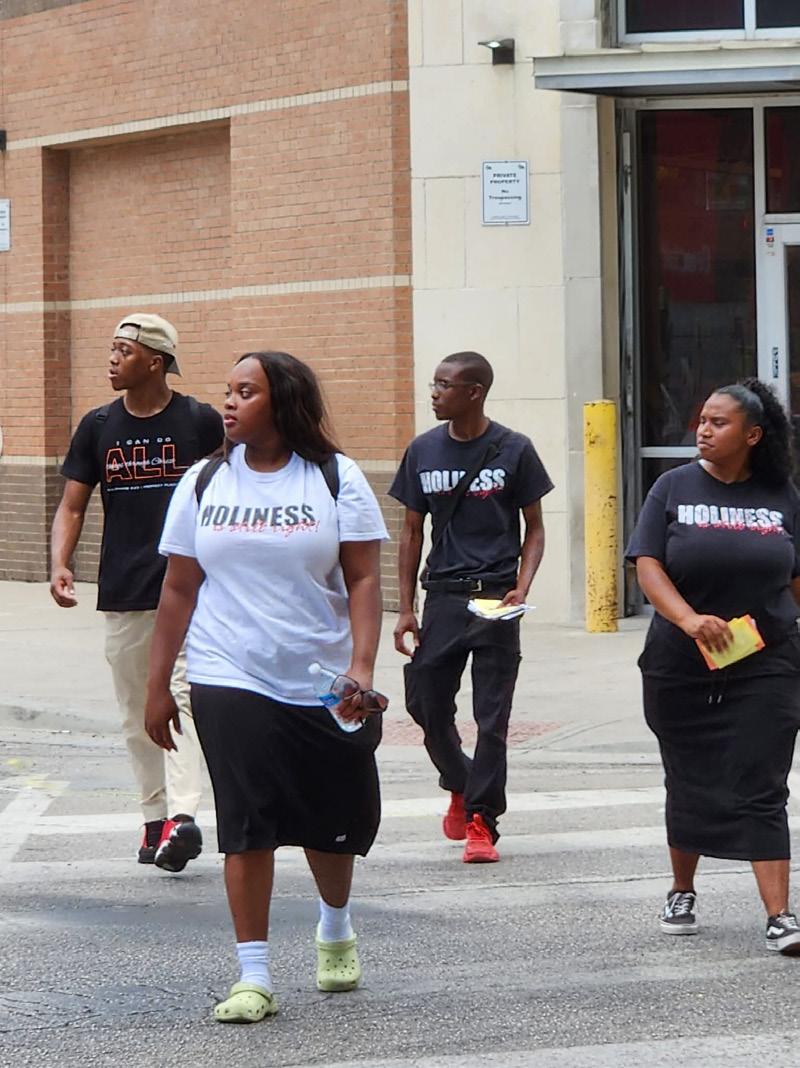
















Editor-in-Chief Jacquinette Murphy
Senior Editor Shawnetta Murray
Interactive Media Director & Design Director Lakisha Walton
Advertising Manager / Finance
Patsy Davis
Editorial Assistant Stephanie Wyatt
Contributing Designers
Octavia Bradley Candice Gilzean
Contributing Writers
Copy Editors
A’Laynah Lee
Asha Scroggins
All articles and materials contained in this publication are the copyright of the authors or publisher except where otherwise cited. All photographs are the copyright of the contributing photographer whose name appears in the credit line. No part of Fired UP’s content may be used in any form without permission from its editors. All articles, columns, and photos are published with the permission of authors, photographers and/or publishers. Request for issues, article reprints or photograph reproduction should be sent to publisher@firedupmag.com. Please note that requests will be discussed with contributors before release unless otherwise agreed. Opinions contained in articles do not necessarily reflect the opinions of the Fired UP publishers or its staff. Fired UP assumes no responsibility for any unsolicited material sent to Fired UP at P.O. Box 398598 Dallas, TX 75339 or its website www.firedupmag.com. Fired UP editors and publishers may be contacted via email at editor@firedupmag.com. Reproduction, modification, distribution, or republication of contents without the permission of Fired UP is prohibited.
Attention, magazine enthusiasts! Prepare for an exhilarating challenge within our pages. To participate in the scavenger hunt, all you need is a keen eye for detail. Flip through the magazine, carefully examining each article, photograph, and illustration for 7 strategically hidden FGHT Firebird icons. They can be found anywhere, waiting to be discovered. They may be tucked away in the margins, subtly incorporated into images, or cleverly disguised amidst the text. So keep your eyes peeled!
Once you find all seven icons, submit the page locations to info@firedupmag.com for a chance to win. The first 10 correct entries will be entered into a drawing for a prize. Get ready to embark on this thrilling scavenger hunt and happy hunting!
Last Issue's Winner: Kierstyn Onic


Beinga preacher’s kid is a beautiful thing! Some may think otherwise, but for me it was a divine gift. The grace extended to my parents as they chose to follow God wholeheartedly paved the way for me to know a true and loving God. Their witness showed me that a life free from sin is possible.
Some of my most joyful memories are tied to their ministry work—street services, park revivals, church trips, youth outreach services and praying for the sick, relatives, and friends in various areas and cities and ultimately pastoring a small church.
As a young child, I especially remember my dad and his fellow evangelist friends boldly preaching on street corners in our city and in neighboring communities. After working all week and serving during mid-week church services, Saturday was no time to sleep late. It was Saturday morning youth service and afterwards, I would hear my dad say, “I will be back—we’re just running downtown to share a quick word.” That “quick trip” often lasted two or three hours as they preached on one corner and then moved to another. I loved that they would preach entire sermons at bus stops—eight to ten minutes long, timed perfectly between buses arriving and leaving. They always went in pairs, just as Jesus sent His disciples in Matthew 10.
What stands out most is the simplicity. They had no microphones or megaphones, only a small New Testament tucked into a shirt pocket, their voices and the fire of the Holy Spirit. Yet their words were strong, loving, and compelling—messages that moved people to tears as they realized their need for hope and deliverance. These men of God walked into hardened communities, prayed with strangers, and shared the gospel as if it were more essential than food itself. When the day’s work was done, they might grab a simple fast-food sandwich and a soda. Their true “meat” was doing the will of God.
Other times, my parents joined ministry friends for three-day revivals—whether in churches, city parks, or apartment complexes. Wherever they went, their mission was the same: to reach people with the good news of Jesus Christ.
Evangelism, at its heart, is the call of a converted soul to bring others to the saving knowledge of Christ. It reminds me of the joy we feel after a wonderful experience—so good we can not wait to tell someone else. We stumble to put our words together and the sheer excitement spills out. That is how it feels to share the gospel.
These early experiences taught me something vital about the role of the preacher. A preacher is more than a voice behind a pulpit. They are a living witness in the community, a covering for their family, and are instrumental in the continuance of church role of pointing people to Christ. Their influence is not measured by recognition or title, but by their obedience, faithfulness, and love for souls. Even now, when I work on the street or see others witnessing beyond the church walls, I am brought back to these memories as a child of a street preacher and pastor.
In this issue of Fired Up Magazine, readers will learn about the modern-day necessity of evangelism, outreach ministry, and the importance of soul winning—reaping a harvest of souls for the kingdom of God. We will explore this aspect of the five-fold ministry to encourage present-day Christians, who profess to be surrendered vessels, to pick up the mantle left by Jesus Christ and the disciples and ensure the continuous spreading of the gospel of Christ. As you flip and scroll through this publication, we pray that your heart and soul are encouraged to do a greater work for the Lord while it is day, for the night comes when no one can work.


Q My family criticizes me for being saved and filled with the Holy Ghost. It is quite discouraging. How can I overcome this persecution?
A Never be discouraged about living for God. Every family has that first person who gets saved and filled with the Holy Ghost. By God's divine providence, He has chosen you. Do not see this as criticism; instead, view it as God working on their hearts. The more they talk about your life, the more you should pray to be an example. They are noticing, and God is working on their hearts. And, whatever you do, do not try to "prove" to them that you are saved. Just pray and let God handle it without speaking a word. There is power in silence, and your life speaks volumes.
Q My five-year-old son has befriended a classmate at his school who has parents who are in the LGBTQ lifestyle. I have realized this is confusing my child. How should I approach this topic with my young son to avoid discouraging him from making new friends?
AA five-year-old child is impressionable. You do not condone the lifestyle; however, never let your son hear you say anything negative. As believers, we must always show the love of Christ. Understand that you, as the parent, are your child's first teacher. It is important that you guide his spiritual, emotional, physical, and mental health. He may 'see' them, but he is 'watching' everything you do. Show him healthy heterosexual interactions without pointing them out. All parents must be diligent in protecting their children. No matter the lifestyle, you are not required to let your child be around any adults whom you feel are detrimental. And remember to teach your child to show the love of Christ at all times.
His friends are important to him, and he can socialize with them during school hours.
Q
I recently graduated from high school and am about to move away to attend college. I am saved, but realize that there are no churches near me that align with my beliefs. I want to stay saved while I enjoy my college experience miles away from home and church. How do I manage and keep from backsliding?
ABacksliding is never an option. Many saints entered college saved, completed their degrees, and graduated saved. Until you find a church that aligns with your spiritual beliefs and meets your needs, immerse yourself in God's Word and stay steadfast in prayer. Fasting is also a powerful weapon that helps to subdue the desires of the flesh. Seek out online ministries that feed you the unfiltered Word, and carefully explore your college's organizations to connect with students who share your faith. There is strength in numbers, and as the Word says, iron sharpens iron. Above all, remember that God is faithful. He will give you the strength to stand firm while still enjoying your college life.
Q
I have been saved for five years now, and I am now desiring a husband. Before I got saved, I did not have any trouble dating, but now it seems that no one in my church is showing any interest in me. I have even joined the Singles Ministry and spoken with a few of the brothers, but it hasn't progressed into anything serious. I do not want to look into the world because I know what that means for my salvation, but I can feel myself getting discouraged and growing impatient. How do I deal with this?
A Continue to be patient and wait on God. Without you realizing it, a brother might be waiting to talk to you—let HIM find YOU. Please

consider talking to brothers without appearing desperate, as that can be intimidating to most men. God will give you the desires of your heart. Before you were saved, dating was easy because you were also worldly. Never rely on the world to satisfy your needs or wants, as that invites trouble into your life. In the grand scheme of life, five years is not that long because God does not operate on time, even though He is a timely God. Also, I encourage you to start preparing for marriage during your waiting season. Your blessing is on the way.
Q
Recently, I encountered a student who corrected me and asked me to refer to her as a ‘he.’ I did not know what to do or how to respond. How do I continue to work as an educator in a school district that requires me to follow their Inclusion Policy without compromising my standards to keep my job?
AMany educators will encounter this situation at least once. It is hard to remain professional without jeopardizing your career. Unless the school is a Christian school, every school district must have an Inclusion Policy. Treat the child with respect. Avoid situations where you need to use pronouns. Always use the child’s name instead. You do not have to lower your standards.
QTwo years ago, I had a stroke that paralyzed the left side of my face, and now I can barely use my left arm. I once thought I was at least a nice-looking lady, even to myself. But now, when I look in the mirror, I just cry because I do not look the same. My face has changed so much, and I cannot understand why this has happened to me. I am just writing because I need some encouragement.
APlease do not let the devil take up space in your mind. God is beautiful in every
situation. His healing power is continually working. During sickness, it is hard to realize that time and chance happen to us all. You do not owe anyone an explanation. Those who love you will accept the present you. Never hesitate to receive prayer for your continuous healing. Also, God has many gifted physical therapists who will help you. Fight for your strength and healing because it will come. Jeremiah 30:17a declares, “For I will restore health unto thee, and I will heal thee of thy wounds, saith the Lord…”

QLately, I have been hearing a lot of messages about forgiveness and how God will not forgive you if you do not forgive others. But how can I forgive my husband, who has been cheating on me for several months now? He knows that I know, which makes it even worse. I do not want to die with unforgiveness in my heart, but it hurts so bad. What does God expect me to do at this point?
AIt is hard to understand God's ways, but He expects you to forgive. Forgiveness frees you from anger, hurt, and mistrust. Let God work out your situation. He will lead and guide you on the path that is best for you. Never allow yourself to be disrespected.
Prayer is the best antidote to your situation. God can change your husband's heart and help him realize the error of his ways. However, remember that God is understanding and He does not want you in any situation that compromises your core values. We encourage you to seek godly counsel.












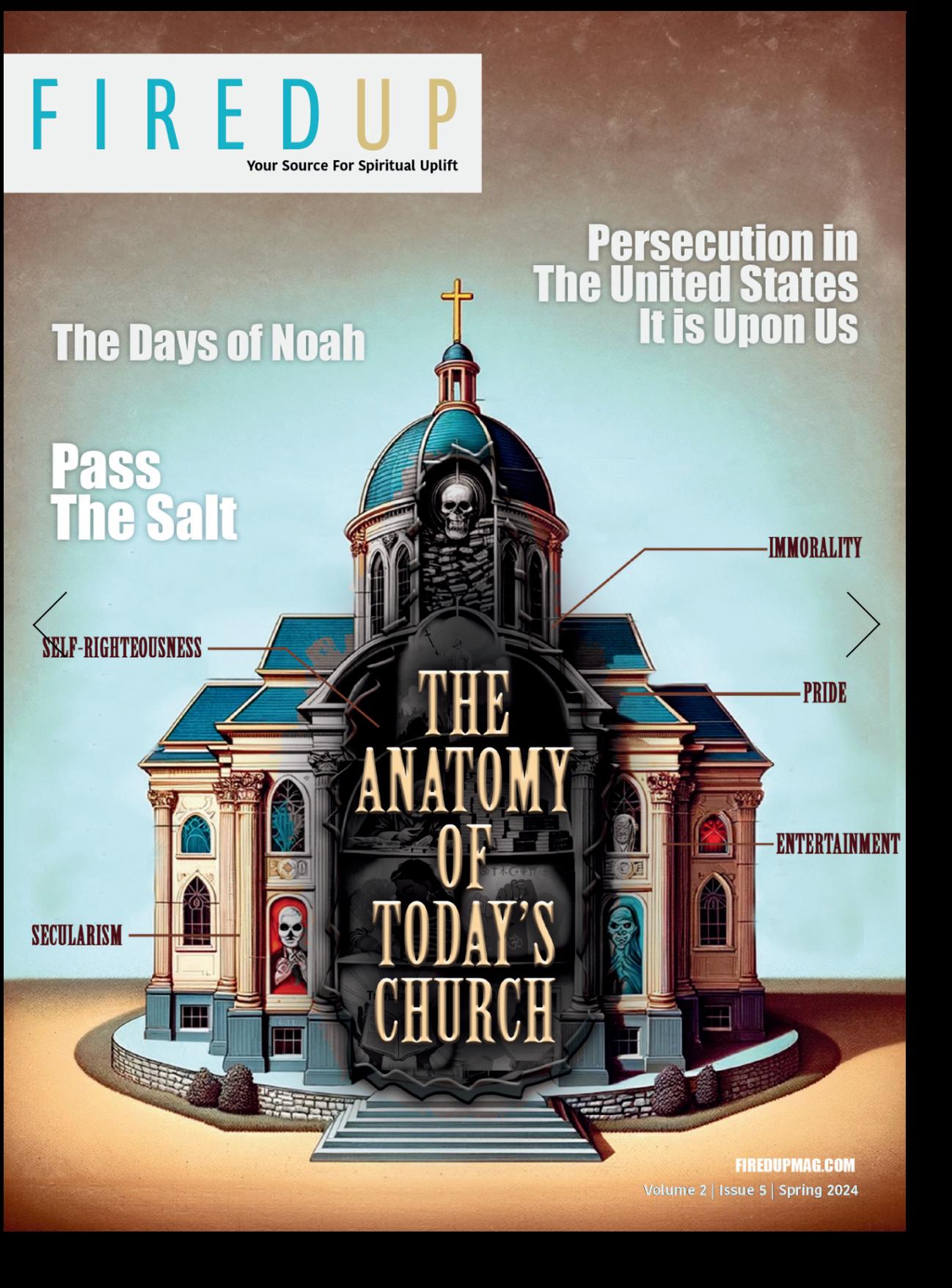

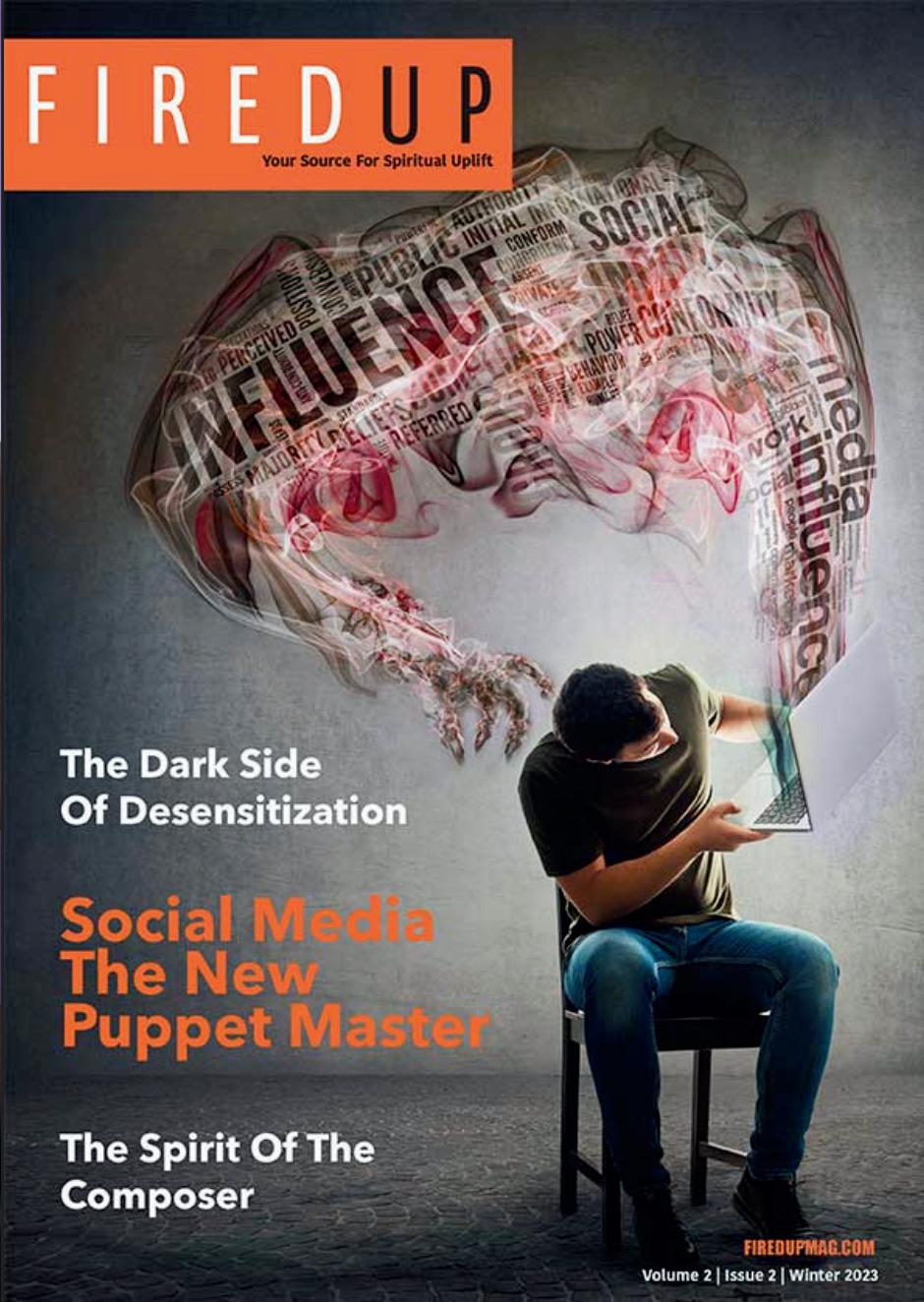





BY: JANICE WYATT
When handling financial matters, a sense of discipline is absolutely warranted. From a natural perspective, three key elements are required to handle one's financial affairs properly: knowledge, wisdom, and discipline. Knowledge is the 'know-how' that comes after obtaining facts and information, while wisdom is the ability to apply that knowledge. The third segment, discipline, is the ability to exercise proper judgment and self-control. This three-part combination is paramount if we expect to live financially fulfilled lives. Proverbs 4:7 says, "Wisdom is the principal thing; therefore get wisdom: and with all thy getting get understanding." In Galatians 5:23, temperance, which is self-control, is listed as one fruit of the Spirit.
For many years, I have met and counseled people about the importance of exercising prudence when it comes to their financial affairs. I know and understand that the thought of handling one's finances can bring on a level of stress. Statistically, a vast number of people prefer not to keep the matter at the forefront of their minds. According to Investment News, only 30% of people are confident in managing their finances.1 Even amid the stress that comes with handling financial affairs, we must remind ourselves to exercise wisdom. Another factor to be considered is the importance of managing our finances with an absolutely pure motive. Although I have observed people operating in deceptive ways with their financial livelihoods for decades, in the long run, such actions can prove detrimental to them.
From a biblical perspective, let us consider King Solomon. The Bible tells us that King Solomon was not only wise, but he was also wealthy. King Solomon was the wisest (mortal) man chronicled in the Old Testament, and is thought by some to have been the wisest (mortal) man of all of scripture. As depicted in 1 Kings 3:9-15, one day King Solomon dreamed that he sought God for guidance on how to govern God's people (Israel) righteously. Solomon could have asked God for riches (wealth), but the posture of his heart was pure and unselfish. As a result, God not only granted King Solomon's righteous desires but also favored the king with wisdom, understanding, honor, and vast riches for as long as he remained faithful to God. 1 Kings 4:29-31 states, “And God gave Solomon wisdom and understanding exceeding much, and largeness of heart, even as the sand that is on the sea shores. And Solomon's wisdom excelled the wisdom of all the children of the east country, and all the wisdom of Egypt. For he was wiser than all men; than Ethan the
Ezrahite, and Heman, and Chalcol, and Darda, the sons of Mahol: and his fame was in all nations round about.”
In scripture, King Solomon applied certain principles to his life. The principles by which he lived should serve as an inspiration to us in our contemporary lives. Research cites 10 strategies, including those for operating business ventures. Some financial disciplinarians refer to King Solomon's principles as wealth codes, which follow.2
1. Use wisdom as our guiding principle.
2. Set long-term goals, rather than living and spending wastefully and haphazardly.
3. Be generous to God and others.
4. Exercise discernment with financial matters.
5. Strategic partnerships with individuals and businesses that will result in achieving goals as well as adding value.
6. Use available resources to make sound decisions.
7. Possess fear and reverence for God and His provisions towards us.
8. Be more organized in life's journey.
9. Display honor and appreciation for those who offer and provide godly counsel.
10. Good understanding of the real purpose of wealth.
If we delve into the wealth codes or principles that King Solomon lived by, we will see how they align with God's desires for us to live. That is, the Bible exhorts us to: (1) use wisdom; (2) when necessary, seek guidance for our lives (Matthew 7:7-8; Luke 11:9-10); (3) establish plans and set goals (Luke 14:28); (4) diligently work toward improving our lives (Proverbs 10:4; Proverbs 12:24; Proverbs 21:5; Colossians 3:23-24).
King Solomon understood the true purpose of wealth, particularly from the standpoint of his kingdom assignment. He used his wealth for the benefit of the nation and for the furtherance of the ministry. Although there were negative results when he lost sight of God, the positive results were these: construction of the Temple in Jerusalem, expansion of the empire, and infrastructure development, which included building of cities, ports, highways, and other economic developments.

Conversely, later in his life, King Solomon fell from God's grace when he no longer worshiped God as the only true and living God. He also embraced idolatry and marriages to foreign women. This eventually led to his degradation. Recall, as I initially pointed out, in 1 Kings 4, God promised Solomon He would show favor to him, for as long as Solomon was faithful to God. This portion of King Solomon's story serves as a reminder of the wisdom in not turning away from God. If we do so, we will lose out on the benefits we could otherwise enjoy.
Another biblical perspective worth mentioning is that of sacrificing for the sake of furthering God's work. In doing so, we can sacrifice our time, our finances, and also our prayers. I have heard an exceptionally wise man say, "When it comes to the work of the Lord, it takes two (2) books: the Gospel book and the pocketbook." This means that, in addition to preaching the Word of God, finances are also necessary to spread the gospel message. This can be achieved through missionary work and travel, feeding the homeless, establishing other churches and missions, and even spreading the gospel message in literary form. Understandably, each one of us is not able to sow financial seeds, but we can do our part by sowing seeds of prayer (for the success of God's work), as well as availing ourselves in ministerial work. For Ecclesiastes 9:10a declares, “Whatsoever thy hand findeth to do, do it with thy might…”
We can glean from the testimony of Apostle John, who stated, “I must work the works of Him that sent me, while it is day: the night cometh, when no man can work. As long as I am in the world, I am the light of the world.” (John 9:4-5)
This article provides an understanding of how to apply godly principles to achieve fulfilled financial living, while also encouraging the use of our financial resources to spread the message of Jesus Christ.
CITATIONS
1https://www.investmentnews.com/ria-news/just-30-ofpeople-are-very-confident-in-managing-their-finances-rightnow/259264#:~:text=RIA%20NEWS-,Just%2030%25%20of%20 people%20are%20very%20confident%20in%20managing%20 their,and%20the%20action%20they%20take.&text=Most%20 Americans%20have%20concerns%20about,it%2C%20according%20 to%20new%20research
2https://www.amazon.com/Wealth-Codes-Solomon-Arthur-Riquelme/ dp/B0CZSRTT59


Anevangelist is not only one who has the ability to reach out, but also the passion and urgency to do so. They are driven to connect with the lost and bring them the message of salvation.
The word evangelist comes from the Greek term euangelistēs, meaning ‘one who brings good news’ or ‘one who proclaims the gospel.’¹ In Ephesians 4:11, the Apostle Paul wrote, “And He gave some, apostles; and some, prophets; and some, evangelists; and some, pastors and teachers.” This verse highlights evangelism as one of the five distinct ministry gifts given to the Church.
Throughout the 20th century, a helpful teaching analogy emerged, using the human hand to represent what is commonly known as the five-fold ministry:
• The thumb represents the apostle, as it can touch all fingers, symbolizing versatility and foundational leadership.
• The index finger is the prophet, pointing and providing guidance.
• The middle finger is the evangelist, the longest finger, representing the outreach to those beyond the church walls.
• The ring finger symbolizes the pastor, committed to the Church (like a marriage).
• The pinky finger stands for the teacher, small yet essential for balance and precision.
As with any calling, there are specific qualities that distinguish those who are truly called to this ministry. Many have walked in the office of the evangelist throughout history. While it is impossible to name them all, we can examine the lives of a few to extract timeless qualities essential for effective evangelism.
The only person in Scripture explicitly given the title ‘evangelist’ is Philip:
“And the next day we that were of Paul’s company departed, and came unto Caesarea: and we entered into the house of Philip the evangelist, which was one of the seven; and abode with him.” (Acts 21:8) Philip (distinct from Philip the Apostle) first appears in Acts 6, chosen as one of seven men to assist the apostles so they could devote themselves to prayer and the ministry of the Word. These men were required to:
• Have an honest report
• Be full of the Holy Ghost
• Be full of wisdom
Philip served as a deacon, demonstrating that evangelists are versatile in their roles. Their ministry extends beyond the pulpit and includes a variety of roles within the Church. Along with being an evangelist, they may also serve as ushers, musicians, sound technicians, or, like Philip, deacons in the Lord's Church. But Philip stood out because of his active evangelism and obedience to the call.
In Acts 8, during a time of persecution, Philip went to Samaria and boldly preached Christ. Miracles followed his ministry, and great joy came to the city. He fulfilled Christ’s commission in Acts 1:8 by reaching beyond
Jerusalem and Judea into Samaria, just as the evangelist must go beyond the confines of the Church and out into the world.
Moving forward in history, John Wesley, the founder of the Methodist movement, exemplified a deep passion for the gospel. Born in England, Wesley traveled to America but returned disillusioned. This experience brought him to a profound spiritual renewal, leading him to preach repentance and revival across England. His heartfelt, convicting sermons stirred hundreds, if not thousands, to repentance and renewal. Evangelists must carry that same intense passion for the Word and the lost, just as Wesley did.
Another giant in evangelism, Smith Wigglesworth, is known for the many miracles God performed through him. Yet his most defining trait was not his miraculous ministry, but his humility.
In one of his messages, Wigglesworth declared:
“There never was a weaker man on the platform... All natural things in my life point exactly opposite to my being able to stand on the platform and preach the gospel. The secret is that the Holy Ghost came and brought this wonderful edification of the Spirit.”
Despite his fame, Wigglesworth never claimed credit for his work. He exemplified James 4:10:
“Humble yourselves in the sight of the Lord, and He shall lift you up.”
A great evangelist understands that the power belongs to God, and they keep the glory where it belongs.
Prayerfulness: Phoebe Palmer4
Evangelism is not limited by gender. Phoebe Palmer, a Methodist evangelist born in New York, was a dynamic preacher and advocate of what she called 'entire sanctification.' We now recognize this experience as the infilling of the Holy Ghost. Palmer led powerful prayer meetings that started as gatherings for women and soon spread throughout the Methodist Church. These meetings played a pivotal role in the Holiness movement.
The essential quality she modeled was a love for prayer. No ministry can succeed without prayer, and evangelism especially requires this spiritual foundation. The evangelist must be deeply rooted in prayer to operate in spiritual power.
In more recent times, Bishop Paul Cannon, Jr., became a beloved evangelist. Originally from Birmingham, Alabama, he was known for his genuine love for people. While a student at Bishop College in Dallas, Texas, he attended a revival conducted by Apostle Lobias Murray and the Full Gospel Holy Temple Church ministry. After being saved and baptized with the Holy Ghost, Bishop Cannon began passionately witnessing to others, using his natural charisma and leadership skills.
Continued on Page 20

Studying the Bible is essential for every born-again believer. It is one of the primary ways we can draw closer to God. The Bible says in II Timothy 3:16-17 that all Scripture is given to us so that we may be corrected, instructed, and thoroughly equipped for every good work. To study means to apply your mind purposefully to the acquisition of knowledge or understanding of a subject.1 When we study the Bible, we should intentionally apply our hearts and minds to gain a deeper understanding of God.
There are many different ways people choose to study the Bible, whether through the SOAP method (Scripture, Observation, Application, and Prayer), scripture memorization, studying a particular topic, or the Panoramic study method mentioned by my pastor. Regardless of how you decide to study, it is essential to approach the Word of God with reverence and an open heart. Man shall not live by bread only, but by every Word that proceedeth out of the mouth of God (Deuteronomy 8:3). Just as bread sustains our physical bodies, the Word of God sustains our spiritual bodies. It is how we grow in the Lord. The Word of God possesses great power, and in this article, I will explore some of the numerous ways it transforms us.
I recall attending college and studying for my anatomy class, which proved to be very challenging. I stayed up at night and studied through Thanksgiving break, because I really wanted to get a good grade. How much more should we study God’s Word so that we may show ourselves approved unto God. We should take that same diligence and search the Scriptures like looking for valuable treasure to learn more about our Father God, the One who created us.
The Word cleanses
The Word of God has the power to cleanse you. Jesus said, "Now ye are clean through the word which I have spoken unto you.” (John 15:3). When you study the Word of God, you are being renewed in the spirit of your mind. It washes away old mindsets, habits, ideologies, and ways of the world. Each time we study, we become more conformed to the image of Christ and can develop the mind of Christ.
The Word reveals who God is
Studying the Word of God helps you know who God truly is— not who people say He is, but who He says He is. The prophet Hosea tells us to “Follow on to know the Lord." (Hosea 6:3) In His Word, you will learn what He likes, what He hates, and how to please Him. When you know your God, you will be strong and do exploits (Daniel 11:32). You'll learn how much He loves you and how He feels about you. When you study His
Word, you begin to understand His will and His heart.
The Word makes you free
Studying the Bible has the power to make you free. Jesus says, “And ye shall know the truth, and the truth shall make you free.” (John 8:32) You are free from all bondage of the enemy, which is Satan himself. There is a saying in the world that people like to use: "my truth." But there is only one truth, and that is the Word of God. When you study the Word of God, you begin to uncover and recognize the lies of the enemy. His tactics or his temptations will not easily deceive you, because you will know the truth. When the enemy tempted Jesus in the wilderness, Jesus used His knowledge of Scripture to fight back. The Word of God is our sword; it is what we use to combat the lies of the enemy.
Studying the Word of God builds your faith in God. Through the Word, we can see and know all the amazing, miraculous things God has done. Faith comes by hearing, and hearing by the Word of God. Truly studying and meditating on the Word of God will build your faith to believe God for the miraculous in your life. When you read about the things God has done, your belief grows stronger, and you begin to know that all things are possible with God. You will see His great delivering power. If you ever find yourself struggling to hold on to your faith, just read the Word. Study how God parted the Red Sea, how He delivered Daniel from the lion's den, how He raised Lazarus from the dead, and your faith will have no choice but to grow.
Studying the Bible is an act of profound devotion to God, and it is very important that we do so. But the real power comes when you put His Word into practice. Faith without works is dead, and we are to be doers of the Word, not hearers only. Jesus says, "If you hear My words and do them, I will liken you to a wise man." (Matthew 7:24) As you study the Word, think about ways you can apply it to your daily life. When you apply the Word, that is when you truly put your faith into action. That is when you can show the holiness, love, and power of God to this dying world.
CITATIONS
1https://www.dictionary.com/browse/study
The SOAP method is an excellent approach for someone just beginning to explore the pages of the Word of God. SOAP is actually an acronym that stands for Scripture, Observation, Application, and Prayer. When reading the Bible, focus on a scripture that resonates with you and observe what is happening (the who, what, why, when, and where). Next, meditate on how you would apply it to your life specifically, and then pray to God about that Scripture.
Topical Bible Study is searching the Bible to understand what it teaches about a specific topic. This method allows you to gain a well-rounded understanding of that topic. For example, if you wanted to know what the Bible teaches on the topic of giving, you would then search as many scriptures about giving to obtain a greater understanding.
The panoramic study method is a method that helps you gain a greater understanding of the harmonic consistency throughout the Bible. You can see the thread that runs throughout Scripture. To study panoramically, read the following every day:
• 5 Chapters from the Pentateuch (Genesis, Exodus, Leviticus, Numbers, Deuteronomy)
• 1 Chapter from the books of History (1 Samuel-2 Chronicles)
• 5 Chapters from the book of Psalms
• 1 Chapter from the book of Proverbs
• 3 Chapters from the Prophets (Isaiah-Malachi)
• 1 Chapter from the Gospels (Matthew, Mark, Luke, John)
• 3 Chapters from the Epistles (Romans-Jude)
• 1 Chapter from the Revelation
Scripture memorization is a powerful method for Bible study, especially for beginners. You can start with one verse or a group of verses. Memorizing the Bible will allow you to build your faith and combat negative thoughts. It also allows you to meditate on one Scripture over time, giving yourself the opportunity for a deeper understanding of that Scripture.


Naturally, we are all students; we are constantly learning something new, often daily. Whether it is sitting in a science class, having principles and values instilled in us by our parents and ancestors, being trained for a job, or self-educating and feeding our own creative curiosities, everything we know now was once taught to us. Without a doubt, we are students of life because life itself compels us to be so. It forces us to study, learn, adapt, and grow. Eventually, we teach what we learn to those who follow us, who place their feet in the footprints we have carefully or carelessly left behind.
But spiritually, when we are born again, we must become students of the Gospel and follow in the steps that have been meticulously ordered by our Lord (Psalm 37:23). We, just like newborn babies, should desire the sincere milk of God’s Word, so that we can grow and increase in spiritual knowledge and scriptural understanding. (1 Peter 2:2).
The Gospel teaches us a new way of living and a new way of interacting with others. In our new lives, the Gospel becomes our instructor, our teacher, and our advisor, while we become those who are instructed, taught, and advised. Therefore, it is of necessity that we attentively follow what it teaches.
Study = Student
“Study to shew thyself approved unto God, a workman that needeth not to be ashamed, rightly dividing the word of truth.” 2 Timothy 2:15
Studying means to apply or exert oneself or give diligence to learning and to the acquisition of knowledge.¹ Studying involves reading, investigating, and reflecting. Therefore, there must inevitably be a present hunger and desire for understanding and wisdom. Now, a student is fully dedicated to the pursuit of knowledge through study, examination, and investigation, with careful and critical thought of any subject. Therefore, one cannot be considered a student if one does not study.
Young Timothy is a prime example of one who was both a student and teacher of the Gospel. Apostle Paul instructed Timothy to study, because he had to approve himself, not unto men, but unto God. So, even though Timothy was learned in the Word from childhood (2 Timothy 3:14-15), he was still instructed to study and delve into the richness of the Scriptures. His life as a student exemplified humility, obedience, and a willingness to seek knowledge of God. Like a son, he was trained and educated under the guidance of the Apostle Paul, and he ate every nugget of wisdom that dropped from that table of understanding. Like Timothy, when we study, we read the Holy Scriptures and investigate the doctrines and mysteries of the Word. We allow it to linger in our hearts by reflecting and meditating on it. Then, we pray and ask God to elevate our understanding as we open our hearts to the tutelage of the Holy Ghost, who leads and guides us into all divine truth.
We can clearly see that studying is synonymous with seeking. The Bible teaches us to seek God out of the book of The LORD (His Word), and READ (Isaiah 34:16).
True students of the Gospel actively seek to know God; we become as little children (Matthew 18:3-4), not immature and foolish, but teachable, humble, pure-hearted, and receptive to truth. Just as a child is humble in stature, we, as students of the Gospel, should carry ourselves with humility and meekness. A child in a classroom sits patiently with folded hands, waiting for instruction; we, too, should be eager to receive guidance from the pages of the Gospel.
Children are always learning. They are inquisitive and question everything, soaking up knowledge like a sponge. They understand that they do not know everything, and we should be the same way. The Word teaches that anyone who thinks they are wise and have studied or learned enough is
a fool. However, once they realize that there is so much that they do not know, then they become wise (1 Corinthians 3:18). For we all look through a glass darkly, and we only know in part (1 Corinthians 13:12). Every good and wise student understands this!
"The Lord GOD hath given me the tongue of the learned, that I should know how to speak a word in season to him that is weary: he wakeneth morning by morning, he wakeneth mine ear to hear as the learned" (Isaiah 50:4).
In the midst of our learning, God, in His divine wisdom, also uses us to teach others. As we grow in the ways of holiness, God places His hands on us as vessels of honor, using us to instill that same knowledge into others. He uses some to teach by calling them into the fivefold ministry as teachers (Ephesians 4:11). These are those individuals that are appointed, charged, and divinely gifted by God to teach with authority and doctrinal responsibility (1 Corinthians 12:28). The calling of a teacher/minister is not a cursory vocation, but a sacred responsibility that comes with greater spiritual accountability. Apostle James said that we should not be hasty to be masters (teachers) because if it is done incorrectly, we will receive a greater condemnation (James 3:1). Every word uttered, every teaching brought forth, and every soul influenced will be measured by God, for He is the one who does the calling.
Then, others may not necessarily be called into the fivefold ministry or bear a title, but God still uses them to teach because of their profound knowledge of the Word. These are the mature saints who regularly feed on the strong meat of God's Word, "...and have their senses exercised to discern between both good and evil" (Hebrews 5:14b). These are the sweetly saved souls who speak words of wisdom to you, that you carry for the rest of your life. They are wells of wisdom that we find ourselves gravitating towards, drawing from the depths of their understanding and experiences in God. They are spiritually mature; therefore, God uses them to teach.
Spiritual maturity is not determined by age or the length of time a person has been in the church, but rather by the individual's strong spiritual discernment, which has been developed through study and practice. Young Timothy was a youth, yet a mature and strong teacher (1 Timothy 4:11-13). King David wrote in the Psalms how he had more understanding than those older than him because he kept God's Word. (Psalm 119: 99-100)
Even if someone has just been saved, every believer teaches by their life, speech, and witness. Collectively, we are commanded to let our lights shine so that those of the world would see the holiness of our character and glorify our God in heaven (Matthew 5:16). That bright, burning light of Christ in our lives teaches the world what it truly means to serve God. It is also a witness against its evil deeds. When we testify to Christ's power to change and transform, we educate people that there is a more perfect and excellent way of living.
Thus, it behooves us as believers to make it a top priority to delve into the rich Word of God and let God teach us, so that we can, in turn, educate others. We must all be ready to answer every person who asks concerning this hope that is within us (1 Peter 3:15). We must always be open to God's leading and be coachable, teachable, and amenable. It is then, and only then, that we are truly students of the Gospel and qualified to be called teachers of the same.
CITATIONS
¹https://www.dictionary.com/browse/study

Iwasrecently working with my son on his science lesson that explained how plants grow. The lesson included a video showing a seed falling into the soil, being watered, receiving sunlight, and then sprouting roots that grew downward, giving it stability. The deep roots would give the plant enough time to blossom into a flower.
This simple scientific lesson is only possible because the seed landed on good soil that was receptive to the seed.
One thing the lesson didn’t cover is how the seed reacts when it falls on the ground and the soil is not receptive. Jesus provides an excellent explanation of seed sowing in the gospels. In both the Gospel of Matthew (Chapter 13) and the Gospel of Luke (Chapter 8), Jesus uses the parable of the seed and the sower to illustrate that people respond to the gospel in different ways when
they hear it. He compares them to various types of ground:
• The way side
• Stony ground
• Thorny ground
• Good ground
Jesus describes the “way side” as a place where the seed will be trampled and crushed before it has a chance to take root. Soon, the birds will come and eat it.
I remember going out with a team to distribute tracts and share the gospel with people we met. I handed a tract to a young girl walking with her mother. As she started to read the tract entitled "What It Means to Be a Christian," her mom yanked it from her hand and threw

it on the ground. She never even got the chance to read it.
The way side is similar to the shoulder on the side of the highway. It is a heavily trafficked area with ample exposure to sunlight and moisture, two essential ingredients for plant growth, but what it lacks is receptive soil. These are the ones who were willing to listen and accept the message of salvation, but something or someone distracts them before they have a chance to take in the message. The enemy can use anything to “snatch” that message from them before they have had an opportunity to receive it. It could be family, friends, or even their own self-doubt.
Regarding the seeds that fell on stony or rocky ground, Jesus said that the soil was not deep enough, and there was no water to water the seed. Consequently, the seed was burned up by the Sun, the same Sun that was necessary for its growth.
I remember reuniting with a young lady who had fallen on tough times. Although an adult now, I still have fond memories of her feisty 14-year-old personality. When we met, she burst into tears, admitting that her life was far from the sweet young lady I once knew. She admitted she had fallen away from God and didn’t know what to do. Doing what I know best, I offered her Jesus. I listened as she wept and, through broken sobs, asked God to come back into her life. She thanked me for taking the time with her, and I invited her to follow up on this experience by attending church. I explained the importance of being rooted in God, and she agreed to come that Saturday night. I reached out to her on Friday to check on her, but got no response. I called again on Saturday to make sure she was still coming. No response. When I finally talked to her again the following week, she no longer desired to attend church, and that was the last time I heard from her.
What could have happened between that day and Saturday? How could you receive the gospel with such joy, then lose it so quickly? In Luke 8:13, Jesus said, "They on the rock are they, which, when they hear, receive the word with joy; and these have no root, which for a while believe, and in time of temptation fall away.”
Jesus said that the seed that fell on the thorny ground will receive the gospel at first, but then thorns will choke the seed and keep it from growing.
While attending college, we had been invited to a party. We knew what usually happened at these parties, and we understood it was not a place for a child of God. One of our friends, a new Christian, was a known attendee at these parties. He had received the same invitation we had, and he shared with us the scripture that God had laid on his heart concerning why he should no longer attend these parties. It was refreshing to see a babe in Christ taking such a firm stand on his convictions!
On the day of the party, we were all gathered together in one of the dorm hall's common areas. We were discussing how many people kept asking us about attending this party, and how we repeatedly declined the offer. We rejoiced at how we were similar to the three Hebrew boys; we had not bowed (Daniel 3). Meanwhile, we had not noticed that our friend was making preparations to leave the dorm hall. "What was that scripture you said God gave you about why we
do not go to these types of parties?" one of us asked him. He sprayed some cologne on, laced up his shoes, and then handed us his Bible, telling us where to turn. Our rejoicing was quickly turned into confusion as we watched him walk out the door, headed to the party.
Jesus wanted us to understand that the thorny ground will indeed receive the seed. The soil is right, it has access to sunlight, and water can be easily absorbed into this ground. With all the right conditions in place, why, then, would this seed still not blossom? For these types of people, it is not necessarily the condition of the soil that hinders their growth, but rather the hostile environment in which the seed found soil.
As mentioned previously, the good ground has all the right ingredients to blossom. What you will notice by comparing the other three grounds with the good ground is that this was the only ground that allowed the roots to grow deep.
Have you ever heard a pastor encourage the members to get “rooted” in God? That is the most important factor in the successful growth of a plant or flower. The root represents stability and maturity. Have you ever tried to pluck a flower from a garden? It is not the easiest thing to do, because those roots have grown deep enough to protect it from strong winds, animals, or even humans who desire to uproot it!
I want to draw your attention to the fact that the sower was actively doing his job. Regardless of where the seeds landed, he was dedicated to throwing out the seed.
In this Christian walk, we are called to be soul winners. Our job is not only to live the gospel but to share it. As soul winners, we must understand the various types of people we will encounter as we spread the gospel.
Yes, it can be discouraging to realize how many different ways a person can respond to the gospel. Quite honestly, as we can see from this parable, there will be more seeds lost than seeds firmly planted.
This should not discourage us or keep us from planting. This should remind us of what the Word of God has already told us, "...broad is the way, that leadeth to destruction, and many there be which go in thereat:” (Matthew 7:13).
However, this should also remind us of the importance of sowing those seeds even more, because God has the power to turn any ground into “good ground.” Our job is to be consistent with the seed distribution. After that, we pray that those seeds find good ground and get rooted in Him!


Iam sure you have seen your fair share of product or service advertisements in your lifetime. Maybe the first thing that came to mind was a brand marketer in your favorite store, or being interrupted by a group of ads that were inconveniently placed at the best parts of a Full Gospel Holy Temple YouTube video. When you think of these advertisements, the product is always at the forefront, and the marketer exercises humility and stands behind the product. One could compare this scenario to Christian ministry, as it involves marketing a product, just as Christians market their new life in Christ Jesus. Since the minister has taken on this new life in Christ, they are now a representative of Christ, just like an employee is a representative of a company. As said in John 3:30, "He must increase, but I must decrease." The way Christians walk, talk, dress, and live should all reflect God's standard for His people while the flesh takes a position of humility to said standard. Additionally, as Jesus said to His Father before His crucifixion in Luke 22:42, "not My will, but thine, be done." This is the kind of mentality that every Christian should strive for every day.
When you look at humility's bottom line, it is the act of being humble. Being humble, among its many definitions, is commonly defined as being 'low' or 'lowly' or 'modest.’ It means not to be prideful or self-absorbed, putting our own importance above the ministry. Next, when you bring in biblical definitions, it is all about serving others and submitting to the plan of God to reap a harvest of lost souls for Him before it is too late. Matthew 5:5 even states that it is those who are meek or who submit to Christ who will inherit the earth. Taking all of this into account, do you think someone with or without humility will be able to advance the ministry of God effectively?
When a person is humble, the flesh is of "low" importance, and those spiritual things are elevated. Jesus even calls Himself "meek and lowly in heart" in Matthew 11:29; so, humility is to be Christ-like. Submission and service to the Lord open up the opportunity to be used by Him. Apostle Paul states in 1 Corinthians 11:1 to "be ye followers of me", but he does not stop there, as the next part of that scripture states, "even as I also am of Christ." More plainly stated, Paul is saying, "as long as I am following Christ, you follow me, and if I deviate from Him, you deviate from me as your leader."
When a person lacks humility, the flesh interferes with ministry. Whether in everyday life or preaching, humility is needed. It is difficult to believe that someone lacking humility will be content in serving and not want to force themselves into the position of being served. In this case, ministry becomes more of a performance with no other purpose but to entertain, and little to no glory is given to God. Verses like Isaiah 42:8 let us know that He will not be pleased with that outcome. This performative attitude can extend to the clothes a minister may wear, as it may overly glorify the body rather than the message. The same can be said about where a person may go. What would you assume if you saw a pastor sitting at a bar with a glass of clear liquid in his hand, even though that clear liquid was nothing more than water or Sprite? It is no wonder 1 Thessalonians 5:22 tells us, "Abstain from all APPEARANCE of evil," meaning that it may not be sinful, but if it even appears that way, stay away from it.



Believe it or not, there is even such a thing as bragging about being humble, or to humblebrag for short. Humblebragging sounds a bit oxymoronic. How in the world is "humble" and "brag" in the same sentence, or worse, the same word? It is defined as using humility and self-deprecation as a way of gaining attention.1 It is basically being meek and lowly over a loudspeaker. It is a sneaky tactic that is very on brand with the devil and his desire to be worshipped, and it has no place in ministry. Not giving praise to our adversary, but he is indeed very cunning. His plan can start with something good, but it ultimately has an evil end goal. Take what happened when the devil used scriptures to tempt Jesus in Matthew 4. The devil took Jesus to the pinnacle of the temple to get Him to do a grand demonstration of His power. Jesus refused and said He would not tempt His God. He chose humility over exhibitionism.
When talking about humility in ministry, there is no greater example than John the Baptist. Despite the divine appointment, he did not get high and mighty. Instead, John exercised humility and considered himself lowly. To put into perspective just how anointed he was, he baptized Jesus - let that sink in. In St. John 1, his introduction was highly regarded; people even sent to him, wondering who he was and whether he was the Christ. The average highly regarded individual would normally like a red carpet intro of themselves and their name in lights. However, when John was asked, "Who art thou?" John did not even bother telling them his own name and instead stated his purpose in ministry and baptism.
Just like the advertisers mentioned at the beginning of this article, informing the public about the product was more important and rightfully so. John could have easily adopted a haughty mindset similar to someone like the Syrian captain, Naaman, in 2 Kings 5, especially considering John had such an anointing and relationship with God. He could have even decided to put on a more fleshglorifying dress code. How would those things have affected John's ministry or his baptism of Jesus, though? Better yet, would he have been able to baptize Jesus at all? Most likely, God forbid. As mentioned before, when the flesh is glorified in what is supposed to be "ministry," it becomes performative, and the purpose (or product) is squandered. As a minister (or marketer) of the Lord and His standard, it is paramount that your light shines as bright as possible with no obstructions. This gives the best chance of the customer (lost soul) buying the truth. (Proverbs 23:23)
CITATIONS
1https://www.merriam-webster.com/dictionary/humblebrag
Qualities of An Evangelist (Continued from Page 10)
Nicknamed ‘Tall Paul,’ he used every opportunity (on campus, in ministry, and beyond) to win souls. People were drawn to him because he sincerely cared for them. An evangelist cannot effectively reach others without compassion. Loving people is not optional; it is the heartbeat of evangelism.
The Evangelist's Character
A successful evangelist demonstrates the following essential qualities:
• Honesty, spiritual fullness, and wisdom (Acts 6)
• Versatility in serving
• Passion for preaching the gospel
• Humility to give God the glory
• Prayerfulness as a spiritual foundation
• Love for people
These characteristics were embodied by Philip, John Wesley, Smith Wigglesworth, Phoebe Palmer, and Bishop Paul Cannon, Jr. Any evangelist, aspiring or seasoned, should strive to develop these traits as they carry the good news to the world.
“…do the work of an evangelist, make full proof of thy ministry.” (2 Timothy 4:5)
¹Bill Mounce. (n.d.). Euangelistēs (Greek definition). In Mounce’s Greek dictionary. https://www.billmounce.com/greek-dictionary/ euangelistes
Church Army. (2019, October 23). The “E” word: Who is an evangelist? Church Army UK. https://churcharmy.org/ blog/2019/10/23/the-e-word-who-is-an-evangelist
Merriam-Webster. (n.d.). Evangelist. In Merriam-Webster.com dictionary. https://www.merriam-webster.com/dictionary/evangelist
Scripture Central. (n.d.). What is an evangelist? Knowhy. https:// scripturecentral.org/knowhy/what-is-an-evangelist
Wikipedia contributors. (2023, December 23). Evangelism. In Wikipedia. https://en.wikipedia.org/wiki/Evangelism
2John Wesley: https://en.wikipedia.org/wiki/John_Wesley
3Pastor Greg Online. (2021, July 25). Smith Wigglesworth: What it means to be full of the Spirit. https://pastorgregonline. com/2021/07/25/smith-wigglesworth-what-it-means-to-be-full-of-thespirit
Wikipedia contributors. (2023, October 19). Smith Wigglesworth. In Wikipedia. https://en.wikipedia.org/wiki/Smith_Wigglesworth

4Aldersgate Renewal Ministries. (n.d.). Women in Methodist history: Phoebe Palmer. Aldersgate.org. https://www.aldersgate.org/women-in-methodisthistory-phoebe-palmer
Wikipedia contributors. (2023, October 15). Phoebe Palmer. In Wikipedia. https://en.wikipedia.org/wiki/Phoebe_Palmer
5FGHT Nash. (n.d.). Bishop Paul Cannon Jr., Full Gospel Holy Temple, Nash. https://fghtnash.wixsite.com/nash/bishop-paul-cannon-jr
Haynes Mortuary. (2014). Obituary for Bishop Paul Cannon Jr., Haynes Mortuary. https://www.haynesmortuary.com/obituary/2657931


BY: PAM BOYD
Howmany moments have you let pass because you allowed fear to speak? For a long time, I was a silent Christian. I believe in God with my whole heart, but I let fear convince me that my words did not matter. I thought I was not eloquent enough, and that someone else could do it better, so I often stayed quiet for too long.
But silence has a cost. The cost? Lost souls and missed opportunities. When we do not speak, someone else may stay bound. I can recall once pulling up to a drive-thru window; after ordering, I felt the urge to say something to the young lady. However, instead of responding, I played it safe. I offered a polite smile, said thank you, and drove away. It may have only been a few seconds, but I chose ease over obedience. It reminded me that sometimes the smallest acts of obedience are the ones we wrestle with the most. When we withhold the truth of Christ, someone else may keep believing lies, and while I thought I was being cautious, I was being disobedient.
I let my insecurities override my convictions. I told myself, "I do not know enough scripture," or "what if I say it wrong?" Yet deep down, it was not about knowledge or preparation; it was fear—the fear of judgment, rejection, and not being enough. The enemy loves to trap us in the very thing we are afraid to do by using our silence as a chain. But obedience to God breaks that chain, and in doing so, we step into our freedom. While I was busy protecting myself, I was denying someone else access to the very freedom I have.
There were moments when I felt the Holy Spirit nudging me to say something, but I kept silent. I smiled, but afterwards the weight of that silence stayed with me. It was not just a missed opportunity; it might have been a missed assignment. What if that person was waiting for me to say something? What if God chose me to plant a seed, and I chose comfort and silence instead? I do not share this to dwell in shame, but I share it as a reminder to myself and to every believer who has ever felt unqualified or too fearful to speak. You are the witness God wants to use. Not when you are ready, and not when you have the perfect words, but right now.
Many Christians do not speak up because we feel unprepared or intimidated. We do not want to offend anyone. We do not want to be labeled as ‘too churchy,’ ‘too radical,’ or ‘too self-righteous.’ We are afraid of rejection or being seen as different.
Were we not called to be different? Jesus said in Matthew 5:14-16, “Ye are the light of the world. A city that is set on a hill cannot be hid. Neither do
men light a candle, and put it under a bushel, but on a candlestick; and it giveth light unto all that are in the house. Let your light so shine before men, that they may see your good works, and glorify your Father which is in heaven.”
We are not saved to hide; we are saved to shine! I hid my light by not being a witness as God has called. I once had someone tell me that I missed people along the way because I have been silent, and that hurt deeply because I knew they were right. To realize I allowed fear to keep me from telling of how God set me free, I robbed people of learning who HE is because of my silence. I thought my voice did not matter, but it does, and yours does too.
You never want to stand on the other side of time, looking back and wondering if a single word from your mouth could have changed someone’s eternity. Being silent does not make you humble, but it makes you invisible in a world that desperately needs to hear what God has given you. If we, the ones who know the truth, stay silent, then who will speak?
Imagine standing before God and realizing you had the answer someone needed, but you never shared it. What about that friend who needed prayer? What about that coworker you never invited to church? What about that family member who passed away without hearing your truth? What about that person in the store you let walk past without saying a word?
This is not about guilt; it is about urgency and the need to speak up when God places that feeling in your heart. Heaven is real, and so is hell. If we genuinely believe that, then staying silent is not an option.
“In the end, it won’t be the noise of the wicked that will hurt the most, but the silence of the righteous.”
– Dr. Martin Luther King Jr.
Writing this article is me breaking my silence. It is my step of obedience; no more hiding and allowing fear to consume me. If you have been silent like I have, know this: God does not need you to be perfect but willing. You do not have to know it all; you must trust the One who does. My prayer is that these words stir something in you and that you allow God to unlock the boldness that has been buried under fear.
Do not miss your opportunity. Someone’s freedom is waiting on your voice.




BY: PAS1
On the day of Pentecost, the Holy Ghost (or Holy Spirit, which is the Spirit of God) was sent to indwell man. On that day, the evangelism of the church started. Peter (one of Christ's first disciples); stood forth and proclaimed that what the people were witnessing was the fulfillment of the prophecy of Joel 2:28. "And it shall come to pass afterward, that I will pour out my spirit upon all flesh; and your sons and your daughters shall prophesy, your old men shall dream dreams, and your young men shall see visions:" The message preached unto the masses on that day actually started the congregation of the church (the church itself began with Jesus and Peter in Matthew 16:18). About 3,000 souls became followers of Christ that day, and church evangelism was born. The message Peter preached was with wisdom, knowledge, and passion. He pointed out the error of his listeners and their leaders, while giving the truth about what had transpired with Christ. Peter was not alone on that day; those who were Spirit-filled, along with Peter, were present as well. The fervency of his words, coupled with the demonstration of the languages, pricked their hearts and caused them to ask, "Men and brethren, what shall we do?" (Acts 2:37). The work of the Holy Spirit was now on full display.
Although Jesus gives the Great Commission in Mark 16:15, in Acts 1:8, He gives His disciples the order in which to spread His gospel to the entire world. It began with Jerusalem, when the Holy Ghost made His arrival on the day of Pentecost, which was first on the list. Next, He added all Judea, covering the area surrounding Jerusalem and the cities of Judah. This was perhaps done by those who were converted on the day of Pentecost, as well as the others in the upper room. He then names Samaria (which includes all the northern tribes of Israel), and then to the uttermost part of the earth. The directions had been given and the course set; it was now time to win the lost for Christ.
Wisdom speaks
The work of evangelizing the world has been ongoing since the day of Pentecost; yet, the enthusiasm for evangelism has seemed to wane in the years that followed. In the early days of the church, eight thousand souls were won at the very beginning, and even more after the conversion of Paul. Paul (who was called Saul at that time) had been a spectator at the martyrdom of the deacon Steven, and went on to become a persecutor of the Christians (Acts 8:1-3). He himself was converted while on his way to Damascus by the Lord Himself in a vision. He became an evangelist and missionary to the Gentiles and was responsible for carrying the gospel throughout the Roman Empire. Through him (and others), the fire of evangelism spread, as they scattered everywhere preaching the gospel (Acts 17:6b).
Today, we who have now taken up the mantle of carrying the Word must take our example from our forefathers who first carried the message. These were men and women who, despite not being wealthy or affluent in appearance, were committed to the cause and learned how to witness to others. In the Book of Acts (Chapter four), when Peter and John were brought before the council after healing the impotent man, they answered them boldly but with wisdom. The council took note that they were seemingly ignorant men, as evidenced by how they looked. However, they could not help but recognize the words of Jesus as Peter and John
spoke with them (Acts 4:5-14). They used the first key to effective evangelism, which is speaking the Word in wisdom. Many of those who go evangelizing today use words, antics, and even gimmicks to impress people, instead of just giving the Word of God. They try to win the crowd through their eloquence and education, rather than providing a simple gospel message and relying on the power of the Holy Spirit. Using words that require a dictionary or a thesaurus to understand, or bringing in spiritual concepts that are above people’s experience, makes for an unprofitable message. If the message is not understandable, then the message is not receivable. This is a mistake that many ministers make in their efforts to spread the gospel. The Word of God alone has the power to change lives; so, the messenger is not as important as the message when it comes to winning lost souls. Those to whom Paul preached at Corinth had more education than most of the other churches. However, he did not go to them with swelling words of man’s wisdom, but preached the gospel of Jesus (1 Corinthians 2:1-2). Paul was fluent in Hebrew, Aramaic, and Greek, but there are rumors that he could speak other languages as well. He had studied under some of the best teachers and was highly intelligent. Yet, he let the gospel be the show, and not himself. To truly carry out the Great Commission, the message must be the same as Jesus' was: simple and understandable.
To be effective in evangelism, you must know what you are preaching about. Some possess what is called "The gift of gab," which enables them to talk on just about any subject. They speak well and carry themselves in a way that makes them believable when they speak. It is a valuable ability to have as a minister; however, it will not go very far in actually winning souls. As previously stated, it is the gospel message that changes lives, not the messenger.
To be effective in preaching the gospel, you must put in the work. By that I mean you must pray and study the Word of God. Many try to get by on that ability that I spoke of earlier and can bluff their way into preaching engagements. They have studied other ministers (instead of the Word of God) and try to copy their delivery. It may sound good, but it offers little to no lifechanging power. I know this is beginning to sound more like a class than an article, but I wish to be thorough in explaining the problem, of which there are two. Problem one is that if you do not spend time in prayer with the one you are preaching about, you cannot effectively preach. Prayer is our communication line with God, and it is where we receive guidance. Problem two is that you cannot skillfully deliver a message if you do not know more than three scriptures. There are sixty-six books in the Bible, and they are all connected. If you do not study, you will not see the connection, and if you do not see the connections, your message will be ineffective.
In II Timothy 2:15, Apostle Paul admonished Timothy to, "Study to shew thyself approved unto God, a workman that needeth not to be ashamed, rightly dividing the word of truth". Unfortunately, we have many shameful ministers today who are more motivational speakers than Word preachers.
The last requirement for effectively doing evangelistic work is being empowered by the Holy Spirit. When Jesus sent His disciples out two by two, he empowered
them through the use of His name. Walking and preaching in that power, they were able to heal the sick and cast out devils (Luke 10:1-17). Some of them were excited and amazed that they were able to perform these miracles, and rejoiced in their excitement. However, Jesus let them know that they were rejoicing about the wrong thing. Subjugating demons was nothing when compared to going to heaven. They were in the wrong spirit and were reveling in the flesh. The empowerment they received from Jesus was short-lived, as He had to return to heaven. Yet, the empowerment they would receive from the Holy Ghost would abide with them forever. To effectively operate in evangelistic ministry, you must first be filled with the Spirit of God. Then secondly, you must keep your priorities straight. The reason we preach is to save souls, and not for notoriety. Many ministers today preach to get congregants and not to change lives, and many evangelists preach for renown, rather than to offer deliverance.
When God sent the Holy Ghost, it was to empower believers to live pleasing to God and to assist ministers as they operated in ministry. That is why we must never lose sight of the fact that we are servants, and not prima donnas. Humility is the hallmark of a good evangelist. There are churches all over the world, so why are there so many issues in the world? In our country alone, we have mega churches all over, but our communities are rampant with all types of sin. We have multiple ways of administering the gospel to the masses; yet, most people are still not living according to God's Word. The
faith that was once delivered unto the saints is now a sad caricature of what we once were. The reason for this is that many do not have the Spirit. The Holy Spirit not only empowers us, but it also guides us into God's truth (John 16:13). The evangelistic spirit that was created on the day of Pentecost must be revived in us today, if we are to fulfill the Great Commission.

One person who I feel exemplifies all the traits I have written about is Philip, one of the first seven deacons, who was chosen as such and was also spirit-filled (Acts 6:5). Next, he preached in Samaria, converting the city, so he actively worked. He left his revival at God's bidding and went and ministered to one man, which exemplified his obedience. He approached the man humbly and asked a question, demonstrating his wisdom (Acts 8:5-39). He later became a full-time evangelist and raised his daughter to follow in his footsteps, showing his dedication as a father (Acts 21:8-9). Lastly, he left us a good example of how an evangelist should be. The need is great, and the time is short; there is no time to sit and revel in past accomplishments. If the gospel message is to change lives, then the faithful followers of Christ must get busy and fulfill Matthew 28:19, "Go ye therefore, and teach all nations, baptizing them in the name of the Father, and of the Son, and of the Holy Ghost."

Matthew 28:19


"How then shall they call on Him in whom they have not believed? and how shall they believe in Him of whom they have not heard? and how shall they hear without a preacher? And how shall they preach, except they be sent? as it is written, How beautiful are the feet of them that preach the gospel of peace." (Romans 10:14-15).
In this passage of scripture, Apostle Paul emphasizes the essential role of preaching and evangelism. God's plan for spreading the gospel involves preachers bringing the message to others. They cannot hear unless someone proclaims (preaches) the message. This alone is a tremendous weight that the preacher carries. Let us discuss the weight of ministry, both spiritually and naturally, and why we need to pray for the preacher.
A preacher is not merely a speaker or a religious leader; they are God's messenger. The words they speak carry eternal consequences, for they are meant to awaken belief, bring conviction, and offer hope. Preaching is not something one chooses; it is a calling, initiated by God and confirmed by the Spirit. This is a divine calling from God. Romans 10:15 declares, "And how shall they preach, except they be sent?"
The preacher is God's mouthpiece, not a motivational speaker or spiritual entertainer. This is sacred ground—handling the Word of life. Paul declared, "For though I preach the gospel, I have nothing to glory of: for necessity is laid upon me; yea, woe is unto me, if I preach not the gospel!" (1 Corinthians 9:16). The preacher does not work for applause or payment; they work for God. There is no 'clocking out,' because the burden for souls never sleeps.
The mandate to preach the gospel is one of the most serious and sacred responsibilities a person can receive. It is not a casual assignment, but rather a divine commission: a charge that carries eternal significance. To stand and proclaim the Word of God means becoming a vessel of truth, a messenger of hope, and a voice through which Heaven speaks.
Despite the weight of this responsibility, the reward of fulfilling this mission is priceless. There is no greater joy than witnessing lives transformed, hearts awakened, and hope restored through the power of God's Word. Being chosen by God and given the task of impacting someone's eternity is both humbling and, above all, a profound joy. Not because the person is worthy, but because God, in His grace, has trusted them with His message. This is a privilege that should never be taken lightly.
Preachers are stewards of eternal truth. They are called to preach without compromise, as stated in 2 Timothy 4:2: “Preach the word; be instant in season, out of season; reprove, rebuke, exhort with all longsuffering and doctrine.” He commands them to preach the Word, not trends, opinions, or philosophies. Whether people want to hear it or not, the preacher must be ready and unwavering. The Word of God is essential, and the preacher must rightly divide the Word, handling the scriptures with reverence. 2 Timothy 2:15 states, “Study to shew thyself approved unto God, a workman that needeth not to be ashamed, rightly dividing the word of truth.” A preacher must not twist the Word to fit culture, comfort, or crowd. They are called to boldly proclaim the Word of God, which speaks for itself. Preachers are watchmen, shepherds, and defenders of the gospel. The message they carry is not theirs—it is God’s Word and must be guarded from deception. This is not entertainment; it is warfare, light against darkness. The preacher is God’s appointed voice for this hour.
The Natural Weight
Preachers often carry burdens no one else sees. While ministering to others, they can feel spiritually drained,
isolated, or even misunderstood by those they serve. Preachers stand before congregations every week, offering hope, guidance, and encouragement. Preachers also experience loneliness at times. Jesus was rejected by His own: John 1:11 says, "He came unto His own, and His own received Him not." If the Son of God was misunderstood, criticized, and rejected, preachers today can expect the same. Often, their passion is mistaken for pride, and their correction is seen as judgment. Even their silence is often mistaken for coldness. A preacher once said that 'ministry often demands strength in public, even when the heart is breaking in private.' There is a sacred loneliness that comes with being called, not because one is unloved, but because they have been set apart.
The life of a preacher requires balance because of the constant tension between public ministry and private devotion. It takes discipline to keep the fire of the Spirit alive without burning out. It also requires wisdom to nourish both others and oneself while working diligently to ensure one does not lose their connection with God, who called them. But oh, the joy of knowing that Heaven rejoices when a single soul turns to God because they heard a preacher makes it all worth it.
Lord, we come to you as humbly as we know how, asking that you would cover your preachers. Shield them and protect them from all hurt, harm, and danger. We thank you now for the call upon their lives. Thank you for allowing them to answer that call and spread the gospel of Jesus Christ. We rebuke the spirit of discouragement, disappointment, and every other spirit that is not like you. We pray that you will touch their hearts and minds, giving them the strength for the journey that you have set before them. When nights get lonely, we ask that you hold them and encourage them to continue the work to which you have called them. When their path feels unbearable, we ask that you carry them through. When the storms of life rage against them and it is hard for them to see which way to go, we ask that you guide them in the right direction and order their steps. We rebuke the spirit of weariness, for we know that we must not be weary in well doing: for in due season, we shall reap, if we faint not. God, we ask that you touch them from the crown of their heads to the soles of their feet. Grant them spiritual boldness, for we know souls are depending on the word they carry. And we ask You to remove every hindrance that would try to keep them from fulfilling Your will.
Help us continue to pray for them and encourage them along the way. Please give them the words to say that will bring salvation and deliverance. Let them feel Your presence and anoint them afresh. Empower them all over again. Strengthen their hands for the work you have assigned to them. Grant them peace in their minds and joy in their souls.
God, we thank you for their lives. Continue to place Your hand upon them. Thank You for every soul that will be won to Your kingdom. We will stand with the preacher, lifting them in prayer. God, we the people will stand in the gap as they preach your Word to this lost generation. Please help us to intercede for them continually. And when their strength wanes, bless us to hold them up, fighting alongside them on the battlefield, standing with them in these last and evil days. For we declare that souls will be saved, deliverance will take place, imaginations will be cast down, demons will be cast out, souls will be freed. And in all of this, may You, Jesus, be glorified and lifted high. This we pray in the mighty name of Jesus. Amen.

BY: MARJORIE D. WILLIAMS

I
n the biblical record, Jesus’ first and last words to Peter were, “Follow me.” The Bible shows us that Simon Peter did just that. According to Foxe Voices of the Martyrs, by VOM, from the out-of-the-way shore of Galilee to the center-of-the-world hallways of Rome: From laying down his nets to laying down his life, Peter followed Jesus.” ¹
Simon was originally from Bethsaida (John 1:44) and lived in Capernaum (Mark 1:29). Both cities are located on the coast of the Sea of Galilee. He was a family man (Matthew 8:14-15). Simon, Andrew, James, and John were partners in the fishing business (Luke 5:10). Simon met Jesus through his brother Andrew, who had followed Jesus after hearing John the Baptist proclaim that Jesus is the Lamb of God (John 1:35-36). Andrew immediately went to find his brother Simon and said, "We have found the Messiah," and brought Simon to Jesus. Upon meeting Simon, Jesus gave him a new name: Cephas (Aramaic) or Peter (Greek), which means ‘rock’ (John 1:40-42).
Later, Jesus, walking by the Sea of Galilee, saw Andrew and Peter casting a net into the sea to catch fish. Jesus compelled Simon to, "Launch out into the deep, and let down your nets for a draught." (Luke 5:4). This was the first incident of Peter speaking up. He said, "Master, we have toiled all the night and have taken nothing: nevertheless, at thy word I will let down the net." (Luke 5:5). They caught so many fish, the net broke, and they signaled their partners to come and help them. There were so many fish that the ship began to sink. Then Jesus said to them, "Follow me, and I will make you fishers of men (Luke 5:6-10).” Immediately and without question, Peter and Andrew left everything behind to follow the Lord. The willingness of Peter to follow the Lord was unquestionable.
For the next three years, Peter walked with the Lord Jesus. It appears Peter became the unofficial spokesman for the Twelve. It was Peter who first confessed Jesus as “the Christ, the Son of the living God,” (Matthew 16:16-17). To make such a statement was an example of Peter’s boldness.
Peter was there to witness many of the miracles Jesus did. For instance:
• Peter witnessed the miracle at Cana in Galilee
• He also witnessed the raising of Jarius’ daughter
• He helped prepare for the final Passover meal: The Last Supper
• Peter walked on water at the behest of Jesus
• He was in the garden when Judas showed up with a band of men to capture Jesus. Peter, exhibiting his “protectiveness” toward Jesus, drew his sword and cut off the ear of the servant of the high priest, whose name was Malchus
• Peter denied Jesus three times
• After the resurrection, Peter was one of the first disciples to rush to the tomb of Jesus.
After the resurrection, Jesus appeared to His disciples three times. The third time, Jesus appeared to 7 disciples at the Sea of Tiberias. Peter decided to go fishing, and the other six disciples followed. They toiled all night and caught nothing. When the morning came, Jesus stood on the shore. He said to them, "Cast the net on the right side of the ship and ye shall find." (John 21:6). At this time, they did not know it was the Lord. They followed His instructions, but were unable to draw in the net for the multitude of fishes they caught. It is important to note that ‘fish’ can refer to multiple fish, especially when they are all the same species. Fishes, however, usually refer to multiple species of fish, especially in scientific contexts.²
Jesus, having prepared fish and bread for them, invited them to come and dine. By this time, they figured out it was the Lord. After they had dined, Jesus addressed him as Simon, son of Jonas (not Peter the Rock), then asked a question, three times, Lovest thou me more than these? Peter answered, "Thou knowest that I love thee". He commanded Peter to feed His sheep and lambs. It was during this conversation that Jesus predicted Peter's death. He then said to him, “Follow me.” (John 21:15-19).
On the day of Pentecost, Peter was one of the 120 people in the upper
room waiting to be endued with power from on high. As the Lord had promised, they were all filled with the Holy Ghost and began to speak with other tongues, as the Spirit gave them the utterance. A multitude gathered and was amazed because every man heard them speak in his own language. Some mocked them, claiming they were full of new wine. (Acts 2:1 – 13)
Peter, speaking to the crowd, informed them that they were not drunk, as they supposed, but were filled with the Spirit of God, as Joel had prophesied. Peter's message was so compelling that about 3,000 new believers from 17 ethnic groups were added to the church. This was the beginning of Peter's ministry of expansion.
Later, Peter healed a lame beggar and preached boldly before the Sanhedrin. In Acts 4, Peter preached to a different crowd. He and John were arrested, but about 5000 souls believed the word he preached.
At the beginning of His ministry, Jesus instructed Peter to "Launch out into the deep." Peter followed His instructions and caught a multitude of fishes, and the net broke. Before ascending to the Father, Jesus instructed Peter to "Cast the net on the right side of the ship. Peter did so, but they were unable to draw the fishes due to the multitude. These two incidents were foreshadowing the souls Peter would bring in as a fisher of men. The life and testimony of Peter continue to bring in souls even today.
There is a lesson to be learned in Peter's preaching. The Gospel is to be made simple and appeal to all people. On the day of Pentecost, 17 different ethnic groups heard the same Gospel, believed it, and were filled with the Holy Ghost. The gospel is for everyone and should appeal to everyone. There is one gospel for the whole world. Even arrest, beatings, and threats could not dampen Peter’s zeal for preaching the risen Christ.
Peter was summoned to the home of the Roman centurion Cornelius, who also believed and received the
Mrs. Peter

Holy Spirit (Acts 10). In this way, Peter “unlocked” three different worlds and opened the door of the Church to Gentiles.
Even as an apostle, Peter experienced some growing pains. Initially, he had resisted sharing the gospel with Cornelius, a Gentile. However, when he saw the Romans receive the Holy Spirit in the same manner he had, Peter concluded, "God does not show favoritism" (Acts 10:34). After that, Peter strongly defended the Gentiles' position as believers and was adamant that they did not need to conform to Jewish law (Acts 15:7-11).
Later in life, Peter spent time with John Mark (1 Peter 5:13), who wrote the Gospel of Mark based on Peter's remembrances of his time with Jesus. Peter wrote two inspired epistles, 1 and 2 Peter, between A.D. 60 and 68. Jesus said that Peter would die a martyr's death (John 21:18-19)—a prophecy fulfilled, presumably, during Nero's reign.
According to biblical historians, Apostle Peter requested to be crucified upside down, because he did not think himself worthy to be crucified in the same fashion as his Master, the Christ. The Bible does not give us any information on when Peter died. However, Jesus did predict Peter’s death in St. John 21:18-19. It was Jesus who verified Peter would be faithful unto death.
1Foxe Voices of the Martyrs, by VOM, Salem Books, 2019, pp. 21 ²https://www.grammarly.com/blog/commonly-confused-words/fishfishes/ ³https://www.britannica.com/biography/Clement-of-Alexandria 4https://www.britannica.com/biography/Eusebius-of-Caesarea
The Bible provides little information about Mrs. Peter. We only know there was a Mrs. Peter because Jesus healed Peter's motherin-law. However, Apostle Paul did mention Cephas and his wife in 1 Corinthians 9:5: “Have we not power to lead about a sister, a wife, as well as other apostles, and as the brethren of the Lord, and Cephas?”
Paul defends his rights as an apostle and mentions that he, along with other apostles and the brothers of the Lord, has the right to bring a believing wife with them on their missionary journeys.
Some historians claim Peter's wife had died before he met Jesus. This claim is debunked by Apostle Paul's statement in 1 Corinthians.
According to historians, Apostle Peter's wife accompanied him and assisted him in his ministry. According to their biography in the Britannica encyclopedia, both Clement of Alexandria³ and Eusebius of Caesarea4 wrote that Mrs. Peter was led away to her death before Peter's eyes shortly before he was crucified. As the writings go, Peter's last words to Mrs. Peter were, "Remember thou the Lord." All claims about Mrs. Peter, except 1 Corinthians 9:5, are based on historical accounts.

BY: NEKEYVIS STARLING
There is something sacred about knowing your life speaks, even when your lips do not move. It is easy to think that being a witness is reserved for the pulpit, a church event, or a spiritual deep-dive on social media. However, some of the most powerful witnesses have never held a microphone or led a prayer circle. They simply lived in a way that brought God’s Word to life.
This became clear to me one ordinary day at work. While I was training a new team member, they shared a conversation they had with one of our executive leaders about me. I had never spoken to this leader personally. There had been no deep spiritual conversations or any obvious church talk. Yet in that conversation, the executive said, “She has the real thing. She is saved for real.” No introductions…no personal exchange. Still, something about the way I carried myself spoke without a single word. That moment made something click. Being a witness is not just about what you say; it is about how you live.
The Bible says, "Ye shall be witnesses unto Me…," (Acts 1:8b), and many assume that means you have to preach, post devotionals, or wear your faith on your sleeve. Yet the disciples were not known just for their words, but they were known because they had been with Jesus, and their lives reflected that truth long before their mouths ever did. (Acts 4:13)
Sometimes, your consistency is the sermon. Your patience under pressure, your decision to stay kind when others are not, or your quiet restraint when it would be easier to retaliate… that is ministry; that is your real witness. That kind of integrity cannot be manufactured; it is developed in the unseen places where only God sees your obedience. What is powerful is that people notice, even when you think they do not.
Your life will speak in rooms you have never entered, and your posture will resonate in conversations you are not part of. Your obedience in private becomes your spiritual credibility in public. You never know who is watching, or when someone will say, ‘There is something different about them.’

Witnessing is not just a public display of faith. It shows in how you handle conflict, how you show up during tough times, and how you treat people who have wronged you. It is reflected in the boundaries you set with love, especially when dealing with family or friends who remember the old version of you before Christ.
One of the most powerful testimonies is when you could have acted out of character, but you did not. You stayed grounded, chose wisdom, and honored peace. That is witnessing.
Your private time with God also shows up in public ways. You do not have to pray loudly for others to hear, or make a scene to prove spiritual authority. The power you have cultivated in your secret place will shift atmospheres the moment you walk in; that is what intimacy with God does. It changes things without needing an introduction.
When the time comes for you to speak on God's behalf, and when a moment calls for bold truth or encouragement, your words will carry weight. People will listen, not just because of what you are saying, but because of how you have been living. Your life laid the foundation, and your actions made space for your voice to be heard. There is no need to prove that you are chosen. When God marks someone, their life becomes the evidence.
Revelation 12:11 says, "And they overcame him by the blood of the Lamb, and by the word of their testimony; and they loved not their lives unto the death." That testimony is not always a dramatic story; sometimes it is the silent victory of a private healing. The maturity you walk in now, the emotional regulation, the peaceful confidence, the boundaries that show character: that is the power of a witness.
So, if you have ever wondered whether your light makes a difference, here is your reminder: it does. Keep walking and choosing what is right over what is easy. Keep shining even when no one notices. Even in silence, your life is speaking. The message is, ‘That one has the real thing.’

Many of us are familiar with the story of Jonah. I remember growing up learning about Jonah in Sunday School, reading the story, watching cartoons about it, and even retelling it to others. There is a reason why the story remains so important today. Besides the significant and well-known part of Jonah's story (being swallowed by a great fish), we are reminded of the importance of obedience and the power of evangelism. At the beginning of this story, we are introduced to Jonah, whom God has called to go to the city of Nineveh, "and cry against it" because of its wickedness (Jonah 1:1-2). However, Jonah responds by leaving and getting on a boat from Joppa, heading to Tarshish.
Scripture tells us that God sent a great wind into the sea, causing the ship to be in danger of breaking apart (Jonah 1:4). As the storm raged on, the men on the ship became panicked and threw items overboard as they prayed to their gods. Through all this, Jonah was found fast asleep on the sides of the ship (Jonah 1:5). After being awakened by the shipmaster, Jonah was asked to pray to his God to see if He would listen. The rest of the men decided to cast lots to find out who was the cause of the storm.
The practice of casting lots was critical in decisionmaking. When seeking an impartial decision, people would "cast lots" to settle any issue they faced. Sometimes, the result of the lot was seen as a divine choice and was trusted by those involved in the process.1 The lot fell on Jonah, and he admitted that he was running from God, telling them that for the storm to end, they would have to throw him overboard. The men tried to avoid it by rowing to shore, but they failed and had no choice but to do as Jonah said. Here, we see how Jonah's reluctance impacted not only him but also those around him.
The men on the ship were in danger of drowning because Jonah disobeyed God. We often fail to realize how our disobedience affects those around us. Jonah thought all he was doing was fleeing God’s call to Ninevah, and that would be the end of the story. However, God showed Jonah that his disobedience had much greater consequences than he could have anticipated. Thankfully, God still allowed Jonah to turn things around. After praying to Jonah’s God and asking Him to have mercy on them for what they were about to do, the men on the ship threw Jonah into the sea. The storm ceased, and the men began making vows and sacrifices to God. God prepared a great fish to swallow Jonah, leaving him in the belly of the fish for three days and three nights (Jonah 1:5-17).
In Chapter 2 of the Book of Jonah, we see Jonah praying to God while he's in the belly of the fish. Jonah's prayer is interesting because he praises God. He recognizes that God was merciful in letting the fish swallow him and yet allowing him to stay alive. At the end of his prayer, Jonah tells God, "I will pay that that I have vowed. Salvation is of the LORD" (Jonah 2:9).
God responds to Jonah's prayer by making the fish spit Jonah out onto dry land (Jonah 2:10). God gave Jonah a second chance, telling him to go and preach to Nineveh.
This time, Jonah obeyed God and journeyed to the city. The message we read is short but powerful: "Yet forty days, and Nineveh shall be overthrown" (Jonah 3:4). We do not know if Jonah said anything else before or after these words. Still, we do know that the people of Nineveh were convicted and believed the Word of the LORD. From the king to the animals, no one was allowed to eat or drink anything, as the people humbled themselves before God and repented of their wickedness. When God saw this, He decided not to destroy the city (Jonah 3:5-10).
When Jonah tried to flee to Tarshish, the Bible tells us he first went down to Joppa. He attempted to run in the opposite direction from Nineveh. Joppa was about 500-600 miles south of Nineveh, while Tarshish was roughly 2,500 miles west (Asia Harvest).2 Jonah didn’t just say "no" to God, but he deliberately went out of his way to try to run from God's presence and calling. For a while, I questioned why Jonah was so determined not to go to Nineveh, to the point that he traveled more than 2,000 miles in the opposite direction to escape. But research into Nineveh's history provides some context. An integral part of the ancient Assyrian Empire, Nineveh was a wealthy city, but as Scripture tells us, it was a place full of wickedness. The Bible, however, does not specify what made the city so wicked. Still, historical records and the culture during the time suggest there was lawlessness in many ways. This resulted in innocent lives being lost and more unimaginable atrocities for the sake of pleasure and idolatry.3
While Jonah's reluctance can be attributed in part to the wickedness of the city, he also lived during a time when he was constantly reminded of the suffering caused by the exile of the Israelites. According to Britannica, Jonah was most likely alive during a period "when memories of the cruelty of Assyrian tyranny would have lingered in legend and oral history" (Murtoff).4 Although Jonah did not personally experience the cruelty of the Assyrians, as he lived during the time of the reign of King Jeroboam II (2 Kings 14:23-27), oral tradition convinced him that these people were the enemy. Chapter four, verse one begins with the words, “But it displeased Jonah exceedingly, and he was very angry,” showing just how deep his resentment toward Nineveh was. After witnessing a wicked nation, one that was Israel’s enemy, turn from its evil ways and be forgiven by God, Jonah did not rejoice or praise God for what He did. Instead, he became angry. Here we see Jonah’s second prayer to God. Jonah tells God it would be better if he were dead because God is so merciful, slow to anger, and shows great kindness. You read that right. Jonah was angry because God is merciful, slow to anger, and kind. This second prayer contrasts greatly with his prayer when he was inside the belly of the great fish. There, Jonah praised God for being a merciful God, but here
his attitude toward God’s mercy shifts. Jonah wanted to see the city destroyed because, in his opinion, they deserved it.
God’s response to Jonah is an interesting one. God prepared a gourd to shade Jonah as he sat and watched the city. Jonah was quite satisfied with this, but the next day God also prepared a worm. The worm killed the same gourd that had shaded Jonah the day before, and God allowed the weather to become harsher, causing Jonah to faint. Once again, Jonah says he would be better off dead (Jonah 4:2-8).
The book concludes with God's words to Jonah. He asks Jonah if his anger over the gourd is justified, and Jonah believes it is. God challenges Jonah’s response, asking if Jonah can be angry over a plant he did not labor to grow, why is it wrong for God to spare the repentant people of Nineveh and their animals (Jonah 4:9-11)?
The Book of Jonah ends with that question, and as readers, we are called to consider the answer.
When we are confronted with an evangelistic opportunity that requires us to go among people we may not want to be around, how do we respond? Many of us can be like Jonah, being angry that God is so merciful and kind. But we must not be so quick to forget that the same mercy and kindness is the reason we received the gift of salvation in the first place. Jonah's story extends beyond a call to obey God (though that is an important theme); it also requires us to evaluate our hearts' posture when approaching evangelism. We should ask ourselves where our reluctance is coming from. Is it fear? Is it because we have had a negative experience with the people or person God has called us to minister to? Do we feel like some people do not deserve the mercy of God? Like Jonah, we find ourselves justifying our response to God’s call because we have created a standard in our hearts to determine who is worthy or unworthy of God’s message.
The truth is, none of us deserved to hear the gospel or receive the gift of salvation, but through grace and mercy, we can stand and declare that we are saved. Whether driven by fear or anger toward the country's practices, valid or not, Jonah had a reason to hesitate about going to Nineveh. Similarly, some of us might have legitimate reasons to hesitate before ministering to the people God is calling us to serve, but we are not called to decide who receives God's mercy or how He chooses to show it. Instead, our role is to be witnesses for God's kingdom and trust that He will do the work He plans to do. Embracing the call of evangelism
involves understanding this truth: evangelism is not about what we think should happen; it is about trusting the work God intends to do in the lives of those we are called to share the gospel with.
1“Casting Lots in the Bible”, Early Church History, https:// earlychurchhistory.org/beliefs-2/casting-lots-in-the-bible/
2“What We Can Learn from Jonah”, Asia Harvest, https://www. asiaharvest.org/what-we-can-learn-from-jonah
3“The Assyrians- Empire of Iron”, Fall of Civilizations, https://www. youtube.com/watch?v=jpAphcaVJIs
4Murtoff, Jennifer. “Jonah”, Britannica, https://www.britannica.com/ place/Nineveh-ancient-city-Iraq

By D’Neara Watson

Imagine that you had a child whom you loved and took good care of, and they did not lack anything that they needed. When they grew up, they confronted you, saying they were old enough now and were leaving home; they wanted to experience life by themselves. After you provided for them, your child left, thinking it would be better on the outside. A while later, you found out they were living recklessly; possibly drinking, partying, gambling, doing drugs, and getting into trouble. You trained them to behave better than they currently do. How would you feel if you knew that the child you raised was now doing things that you instructed them not to do? Most likely, your heart would be broken, and you would be beyond disappointed. Then one day, you heard a knock at your door; you opened it to find your wayward child at your doorstep begging you to forgive and accept them back. What would be your response? Would you welcome them home and forgive them even after they have strayed off course?
In Luke 15:11, Jesus begins the story of the Prodigal Son. The younger of two sons, he asked to collect his inheritance while his father was still living. This was an act of disrespect and selfentitlement, interpreted as the son wishing his father were dead. Although this request might have saddened his father, he still gave him his portion of the inheritance. Not long after receiving it, the son packed his possessions and journeyed to a far country.1
Prodigal began wasting his money living wildly, throwing caution to the wind. He was living for the 'now' without any concern for the future. Eventually, he had spent all his monetary possessions. A famine came upon the land where he was dwelling, and he began to be in want. He had no friends to help him, and no one would give him anything to eat. This lost son was at his lowest. The only job he could find was that of feeding hogs as a hireling of a resident of that country. His task was considered degrading and shameful. He was so hungry that he almost ate the slop he was feeding to the hogs.
Prodigal had truly hit rock bottom. It was then that he came to himself, realizing that he did not have to starve when he had a father who could feed him. He humbled himself, putting away pride, rehearsing the apology he would give his father when he got back home. "I have sinned against heaven and before thee. And am no more worthy to be called thy son: make me as one of thy hired servants." (Luke 15:21) He would rather live as a servant to his father than stay in this far country; he understood that nothing on Earth was better than being home.
He began making his way back home and was still a reasonable distance away when his father saw him. Having compassion for his son, the father ran and embraced him. The son repented, and although he did not deserve it, the father received him with love. He had never stopped loving him and yearned for the day when he would return home. The father was overjoyed that his son had returned. He made a feast to celebrate. The father instructed his servants to bring forth the finest robe (signifying honor) and place it on his son. Next, the father instructed his servants to bring a ring, symbolizing authority, identity, and family heritage. Lastly, shoes, meaning lost dignity and a place in the family, were reestablished. He must have felt unworthy to receive such a feast and be clothed with such honor. His father announced, "For this my son was dead, and is alive again; he was lost, and is found". (Luke 15:21) The son was restored. The joy he must have felt knowing that he was home, where he belonged. Even though he had gone astray, he was grateful that he was welcomed back.2
You may find yourself in a situation similar to that of the Prodigal Son. You may not have physically journeyed to a far country, but spiritually, you have, because when you leave God, you travel far away from His safety. When you walk away from God, meaning you stop following God's commandments, and start living unrighteously, doing worldly things, you risk losing everything. You may seem successful for a while, but it is only a matter of time before things fall apart. One may have come to this point. Thinking that if they left God, they would have fun and be fulfilled. Instead, most are left feeling empty because God, the source of true joy, is missing.
Repent and turn back to God. He will restore you. 1 John 3:1 states, “Behold, what manner of love the Father hath bestowed upon us, that we should be called the sons of God”:
Are you a prodigal son or daughter? Have you left your refuge of safety and provision for worldly pleasures? The Father is waiting, and He wants you to come home.
CITATIONS
1wisdomlib.org/christianity/concept/far-country
2https://eitan.bar/articles/parable-prodigal-son-robe-ringsandals/

BY: RAPHAEL ROKER
Imagine you see a child playing in the street while a car rushes toward them. The child does not see or realize they are in danger—but you do. So, what do you do? Do you leave the child to get hit by the car, or do you warn them to move out of the way?
I know I would do everything in my power to warn and even help that child escape danger. That is what a preacher does.
Now, what if that child turns around and screams, kicks, or resists because they didn't like your tone or did not believe they needed your help?
Welcome to the life of a preacher.
As a preacher, the reaction of people, whether positive or negative, is not your concern. You leave the results to God. You have done what you knew was right, and even if they do not see it now, you have helped save their lives.
Preachers, you are necessary.
I remember when I was in elementary school, my grandmother always encouraged me to share the Gospel wherever I went. I would be dropped off early and gather with my friends for prayer meetings and Bible study. We would hold hands in a circle and pray before school started.
I didn't realize it would cause opposition from others at school. I was young, had no hidden motives, and did no t understand why they opposed me.
I was called ‘soft’ among other things. I was ridiculed, bullied, and it got to the point where a group of boys would spend their breaks following me around and throwing rocks at me— literal rocks.
I remember telling my grandmother, and although she was not happy about it, she encouraged me to understand that this is part of the cost of preaching the gospel.

As a young boy, those painful moments could have broken me, but God's strength was working in me. I was determined not to let those boys break me.
Do you know what the beauty of it was? Some of those same people came back later in life, saying things like, "Thank you for standing up," or "You have never changed after all these years." Some even came asking for spiritual advice or prayer. I did not realize it at the time, but God was planting seeds in them through me all along.
Learn from their Example
In a world where so many are afraid to stand alone, be like Esther, a young Jewish woman who became queen and chose courage over fear, declaring, “If I perish, I perish” to save her people. (Esther 4:16) Be like Peter and John, two of Jesus’ closest followers, who, when told by religious leaders to stop speaking about Him, prayed for boldness instead of giving in to cultural pressure. (Acts 4:29) And in a time of ‘microwave’ ministry, be like Evangelist Mordecai Ham, who preached night after night during a revival with no response— until a young man named Billy Graham finally stepped forward and gave his life to Christ. What we need today are not just messengers but bold and faithful ones who will stand even when no one else does.
We need preachers today who are dedicated and faithful to their calling—preachers who don't mind plowing and tilling the soil until the harvest comes.
Preachers, I understand that in a world that celebrates popularity, cultural relevance, and compromise, you might feel like you're getting the short end of the stick. You may think your life has no rewards, but that is a lie the devil tells. The lies of a culture-driven church blind us to the true reward of ministry. As a Bible college student, I learned that "the apex of all Christian endeavors must be to place the jewel of a soul in the crown of our Savior, so that the Lamb who was slain may receive the reward of His suffering."²
Preachers, there is no greater or more lasting reward than seeing souls come to know Jesus. Sure, Scripture mentions

crowns we can look forward to, but do you know where those crowns will end up: right at the feet of Jesus. I know modern church culture tells us that the reward is a bigger church, a mansion, an expensive car, and 20 million followers on Instagram—no, not so. Buildings will crumble, clothes will rot, cars will rust, trends will fade, but only what you do for Christ will last.
When You Feel Alone in the Fight
Preachers, I will not deceive you by saying that crying out and preaching the gospel are easy. They are not. Sometimes, you can feel alone when the world, family, and friends turn against you.
Elijah, one of Israel's greatest prophets, was known for his fearlessness and bold proclamation of God's truth. During widespread idolatry and moral decay, he felt like he was standing alone. But God had to remind him that there were 7,000 in Israel who had not bowed to Baal (1 Kings 19:18).
Indeed, God might not have everybody, but He does have somebody.
An old song says, "Everybody ought to know who Jesus is!" I agree one thousand percent with that. The question I have is, how will they (the world) know who Jesus is?
We Need the Preachers
In a world where destruction roams, we need the preachers. In a world that calls good evil, we need the preachers. In a world that calls right wrong, we need the preachers. In a world that celebrates compromise, we need the preachers.
In a world that shouts, ‘Do not speak at all nor teach in the name of Jesus,’ we need preachers.
Preachers, I say again, you are necessary!
A Final Word from Scripture
I leave you with these verses from Romans 10:14-15 (KJV), which says, "How then shall they call on him in whom they have not believed? and how shall they believe in him of whom they have not heard? and how shall they hear without a preacher? And how shall they preach, except they be sent? as it is written, How beautiful are the feet of them that preach the Gospel of peace, and bring glad tidings of good things!"
CITATIONS
1https://billygrahamlibrary.org/this-date-in-history-nov-1-1934-billygraham-accepts-christ/
²This extended phrasing has been used by modern preachers such as Rod Parsley (Revival If), but it is rooted in the 18th-century Moravian missionary cry: “May the Lamb that was slain receive the reward of His suffering.” https://www.thebereancall.org/content/may-lamb-wasslain-receive-reward-his-sufferings



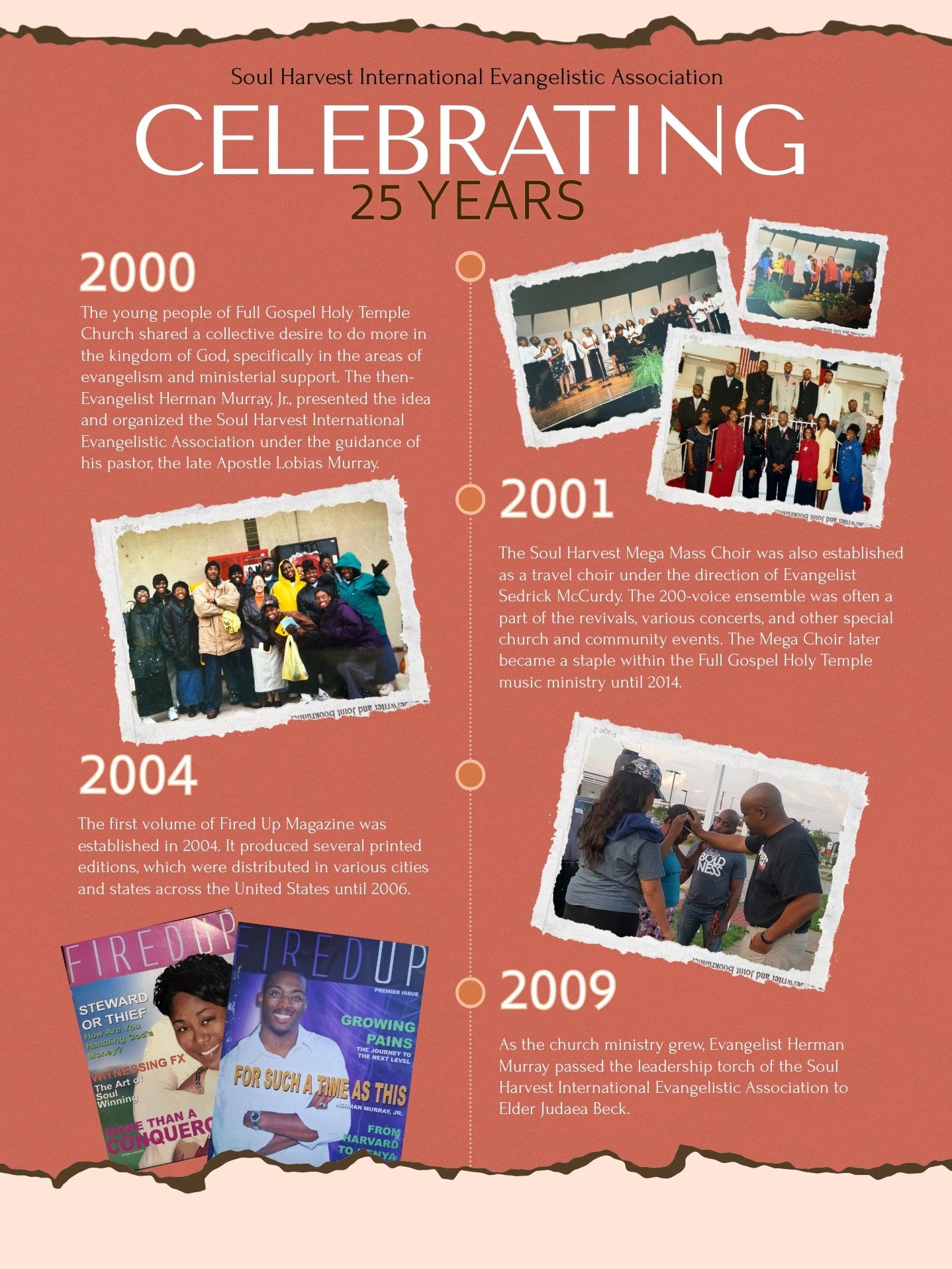

BY: STEPHANIE WYATT AND JACQUINETTE MURPHY
“And He said unto them, Go ye into all the world, and preach the gospel to every creature.” (Mark 16:15)
The words of Jesus Christ, commanding His disciples to evangelize the world, are known as the Great Commission. This responsibility was not only for the disciples of Christ, but rather, it is clearly the duty of all who have ascribed to being followers of the Lord Jesus, through salvation.
In 2000, the young people of Full Gospel Holy Temple Church shared a collective desire to do more in the kingdom of God, specifically in the areas of evangelism and ministerial support. The then-Evangelist Herman Murray, Jr., presented the idea and organized the Soul Harvest International Evangelistic Association under the guidance of his pastor, the late Apostle Lobias Murray.
The mission was simple, and the mandate was serious. The young people wanted their peers to know the joy of living a transformed life in Christ. This organization's target audience was post-high school young adults, and it evolved into an expansive outreach movement that ignited a divine fire that still burns bright twenty-five years later.
The Soul Harvest International Evangelistic Association served as a conduit for shaping the zealous hearts of young Christian adults through biblical education on soul-winning and outreach. This education also equips and empowers them to be effective witnesses and ambassadors for Christ.
At its inception, the Soul Harvest Back-to-School Revival featured two evenings of workshops and revival services. Youth took the lead, hosting mini spiritual life workshops that flowed into a dynamic, youth-led worship service. What began as a simple gathering has since grown into an anticipated annual event. These activities were designed to equip peers to walk boldly in their salvation. God placed His approval on this effort by bringing the community out in droves. Vans and buses of youth came to this two-night revival. God filled the chapel, and the power of the Holy Ghost changed hundreds of people's lives. Evangelist Herman Murray, Jr. of Dallas, Texas, and

Evangelist Carolyn (Murray) Halton of Simmesport, Louisiana, were speakers for this inaugural year.
The work was only beginning. The new outreach team was ablaze and began to meet on select Saturdays, dispersing to pass out tracts in their local community with the simple goal of sharing the gospel of Jesus with someone. Young people were reaching other young adults.
The expansion within the first year was explosive, and the members of the Soul Harvest International Evangelistic Association were on the move, accepting meeting invites to host one-night revival services on college campuses. The group traveled near and far, to campuses such as Paul Quinn College, Texas A&M University-Commerce, and Southern Arkansas University, hosting revival services in the student centers. These services encouraged the youth to allow God to transform their lives through the power of the Holy Spirit. College students would stop to hear the Word, answer the altar call, and then bring their peers back to the service to experience this move of God. Signs and miracles began to follow this great work with a harvest of souls at each event.
In 2001, the Soul Harvest Mega Mass Choir was also established as a travel choir under the direction of Evangelist Sedrick McCurdy. The 200-voice ensemble was often a part of the revivals, various concerts, and other special church and community events. The Mega Choir later became a staple within the Full Gospel Holy Temple music ministry until 2014.
The work continued to focus on three main areas for youth as the overall church ministry advanced: ministerial training, corporate ministerial support, and soul-winning outreach. Soul Harvest pioneered several witness and soul-winning tools that are still utilized today.
Under the leadership of Laurese Murphy-Montemayor, the outreach arm organized street service teams and
schedules for young adults while coordinating ministry events, including a citywide street service day. The team also developed witnessing tool kits—complete with T-shirts and bumper stickers—so youth could share their faith daily under the mantras ‘Changed by the power of the Holy Ghost’ and ‘Holiness changed my life.’ These tools were intentionally designed to spark curiosity and open conversations about the gospel. Collectively, these efforts ignited a deeper spiritual fire, compelling the youth to go into the harvest and reap the vineyard for Christ.
The corporate arm, led by the late Kelvin Oliver, began to work on advancing the ministries and auxiliaries within the church, including the website, publications, media, and technology broadcast ministries, as well as new member and visitor experiences. These initiatives orchestrated Christian events and interior programs to engage and strengthen the body of Christ. During this time, the first volume of Fired Up Magazine was established in 2004. It produced several printed editions, which were distributed in various cities and states across the United States until 2006.
The ministry training team began providing more targeted training and mentorship options for those aspiring evangelists and ministry workers. This led to the development of biblical training courses, as well as guidance on how to work in ministry and support for young leaders worldwide.
As the church ministry grew, Evangelist Herman Murray passed the leadership torch of the Soul Harvest International Evangelistic Association to Elder Judaea Beck in 2009, to continue this work. During this time, the "Taking It to the Streets" banner of Soul Harvest began to really manifest. The Soul Harvest street service and revivals began to blossom and yield a harvest of souls. Young adults were able to share their salvation stories with the masses and deliver a lifechanging gospel message every week in different cities and communities.
Additionally, Soul Harvest developed an annual revival series in churches across Texas, geared toward youth. Some of the cities were Houston, Rosenberg, Waco, Greenville, and Temple, in addition to the well-established annual four-day Back to School Revival and Rally. Young adult participants would travel via bus for ministry events.

In 2018, the mantle was passed to Evangelist Shawnetta Murray, who has elevated the imprint and reach of the Soul Harvest ministry, bolstering its mission to win souls through more intensified instruction. Offering ministry training and interactive learning sessions, Soul Harvest has seen considerable growth in its outreach ministry efforts, especially with an increase in youth involvement. The Soul Harvest team has firmly committed itself to going into the highways and hedges, preaching on the streets, traveling to FGHT fellowship churches with a team of evangelists, and providing practical training on effective soul-winning to the members.
With great excitement and enthusiasm, Fired Up Magazine launched its second volume in 2022 and continues to grow, expanding its audience and reach. Published quarterly in print and digital formats, Fired Up aims to uplift and inspire its readers with thought-provoking articles, interviews, and literary works.
In 2025, Soul Harvest hosted its inaugural Evangelism Summit. This two-day event was organized to bring soul winners together to learn how to become more effective witnesses in all places and at all times. The Summit provided a comprehensive experience that included lecture workshops, interactive learning sessions, and exhortations from Apostle Herman Murray, Jr., Pastor Judaea Beck, and other experienced ministers in the fields of evangelism and outreach.
What's next for Soul Harvest? President Shawnetta Murray shared, "Our future endeavor is to continue our mission of setting this world ablaze with the gospel of Jesus Christ, by expanding our reach in the United States and across the world via citywide, nationwide, and worldwide crusades, as well as international mission trips. One immediate goal of the Soul Harvest Evangelistic Association is to reignite the love of Jesus Christ and a hunger for the Word of God in the hearts of our young people, particularly on college campuses. We, as one body, are committed to delivering the Gospel of Jesus Christ with fervency and with compassion because everyone ought to know who Jesus is."
BY: STEPHANIE WYATT
Have you ever driven down the street and witnessed a street preacher in action? You know, the person holding up a 'Jesus Loves You' sign while boldly declaring the Word of God? Do you ever wonder what compels these preachers to go out into a public setting and do this?
Fired Up Magazine recently had the opportunity to interview Evangelist Kevin Jones and Evangelist Georgetta Wallace. Their willingness to carry the gospel of Jesus Christ to the streets and everywhere they go is genuinely inspiring. Read their stories and hear their hearts…
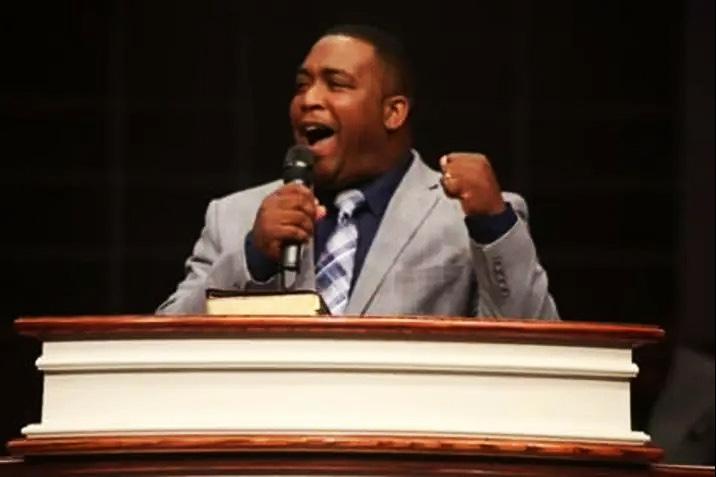


When did you realize God called you to be a street evangelist?
I had a burning desire to tell as many people as I could about the Lord. It was at that point that I realized God started dealing with me about ministry. I was so excited that the Lord saved me and filled me with the Holy Ghost. I would share the Word of God with my friends and give my testimony. At that time, my pastor, Apostle Lobias Murray, would always encourage me to seek God. As I began to seek God, I would ask Him, "What did you call me to do?" For many days, I sought him. I wanted to be sure. I eventually started going out to street service with the Soul Harvest Evangelistic Association. Under the leadership of Elder Judaea Beck, we would go to different communities and pass out tracts. I would go out and work with Elder Beck, the late Elder James Coleman, and Evangelist Veda Smith in different street services. We would testify and minister the Word of God. I am determined to do as 2 Timothy 4:5 states, “But watch thou in all things, endure afflictions, do the work of an evangelist, make full proof of thy ministry.
What experience in your personal life contributes to your passion for street ministry?
What compels you to be faithful and keep the fire blazing to take the gospel of Jesus Christ outside the four walls of the church?
You never know when a person has their last opportunity. And now I do not want to see anyone lost. Jesus commissioned us to go. I realize outside the four walls, there is a dying world that needs to hear the gospel. People need good news. Every time we take to the streets, we are taking away the excuse from the people and letting them know that Jesus is the answer. We have an opportunity to snatch another soul out of the devil's hand. The Bible says in Luke 14:23, “And the lord said unto the servant, Go out into the highways and hedges, and compel them to come in, that my house may be filled.”
When I lost a very good friend in my life, and I was faced with a charge of homicide with a deadly weapon, I felt like my life was over; there was no coming back from this. I was on my way to the county jail, to spend the rest of my life, so I thought. But God took drugs out of my system and released me from a criminal case. That was the time when I heard God speak to me. I had never heard God talk to me the way He did. That really got my attention. I made up my mind. I did not want to lose my life on the street. And in 2001, I asked the Lord to come into my life, save me, and fill me with the Holy Ghost with fire. I have not been the same ever since that day.
When did you realize God called you to be a street evangelist?
I have always been able to witness to people by word of mouth. As soon as God saved me, I began to spread the Word and share the difference that had come upon me. About two weeks after I got saved, I witnessed to my coworker, and she got saved and filled with the Holy Ghost. And ten days later, her husband got saved and filled. Eventually, three other coworkers got saved and filled over fifty years ago, and they are still members of the Full Gospel Holy Temple church. When I got saved, I knew I had to tell it!
What experience in your personal life contributes to your passion for street ministry?
Growing up, my parents were alcoholics, but we had to go to church every Sunday. So, I knew as a kid that faking and shaking was not the way to go because I watched my family live one way and say something else. Once I got saved, it ignited a passion in me to truly live the life I knew God wanted me to live, fueling my desire to be a witness. I stand on the Scripture Psalm 105:1. I love to make known His deeds among the people.
What encouragement can you offer to other ministers who feel the burden of reaching lost souls in the highways and hedges?
I want to encourage you that God has something great for you if you hang in there. Spend time with God in prayer and give yourself to God. Study the Word of God. Be consistent, do not run before your time; wait on God. Your gift will make room for you (Proverbs 18:16) to continue carrying the burden for lost souls.
What impact have you experienced in your street ministry?
I have seen the blinded eyes open, and people get saved and filled with the Holy Ghost. On one occasion, as we were conducting street service, a police officer came and attempted to stop the service. We knew it was nothing but the devil. After talking with her and letting her know we complied with city policy, she began to cry. Despite the disruption in what we were doing, God still saved people that night and filled them with the Holy Ghost.


What compels you to be faithful and keep the fire blazing to take the gospel of Jesus Christ outside the four walls of the church?
The compassion that I have for lost souls compels me to keep going and spreading the good news as God leads me. No matter where I am, whether it is at the grocery store or gas station, I take tracts with me everywhere I go. I stay ready and equipped.
What encouragement can you offer to other ministers who feel the burden of reaching lost souls in the highways and hedges?
Seek God for wisdom for the who, what, when, and where.
What impact have you experienced in your street ministry?
God has blessed me to witness to people in various places and pray them through to the Holy Ghost. Whatever God tells me to do, I will do it. Not long ago, I was blessed to pray a woman through to the Holy Ghost on a Wal-Mart parking lot.
Fired Up writer, Stephanie Wyatt, had the wonderful opportunity to converse with the anointed songstress, Dana Williams, discussing her commitment to God and how singing for the Lord has transformed her life.
When did you begin singing, and what was the inspiration?
I began singing as a young child. I recall that for Easter and Christmas programs at church, I would lead the songs. However, I began to realize God gifted me to sing when I moved to Marshall, Texas, in the year 2000. During that time, my inspiration was the late Evangelist Margaret Kiel, who gave me opportunities to sing.
When did you know that the singing ministry was your divine appointment?
In the year 2017, when I moved back to Dallas, Texas, it was the starting point of healing for me. During that time, God was healing me from

my past. It was during this season that I began experiencing a change in my life, and it happened through my singing.
How did your life experiences shape your role in ministry?
Once God began to heal me in 2017, I found myself going through different areas in Dallas where there was hurt and pain from my past. In the midst of that, it led me to think about what I went through. I began to pray, which led me to singing. Then, when I would be called to sing in a church service, I would lose myself and talk to God. But I was also singing to encourage someone else.
What influences your desire to reach people through singing?
I want people to know that there is a way out. Knowing that Jesus rescued me influences me to want to reach others. I want to let people know that Jesus is real. Growing up, we heard that Jesus is

real, but experiencing Jesus for yourself is different.
Explain the importance of being a yielded vessel to God in reaching souls. Yielding to God means to decrease and surrender your full self. You must not put yourself in the way of God moving through you. What keeps me grounded is thinking about my past when I did things on my own. In doing this, I always failed. We must always remember, “Who am I without God?”
What key attributes are essential for a songstress to possess?
In the music ministry, a person must be constant in prayer, stay in the Word of God, and always keep their mind on Him.
How do you spiritually prepare to minister in song?
When given a song to minister, I study it and go into the Word of God. I listen to the entire lyrics and dissect the song, and realize what God is saying through the message of the song. This will help you properly minister it.
What are some testimonials or impact stories that have come about because of your commitment to God’s call on your life?
When I have ministered certain songs, there are testimonials I have been told by people I know and those I do not know. I have been told that people's lives have been changed, healed, and

strengthened through my commitment to sing in humility. Simply put, being obedient to God and doing what He has called me to do, while also hearing how my “yes” impacts others, is an indescribable feeling.
What ministry opportunities have you had in addition to singing in your local church?
I have been invited to be a special guest at various Full Gospel Holy Temple fellowship churches, such as in Dennison, Lancaster, and Garland, Texas. I have also had ministry engagements beyond the walls of the FGHT ministry to sing and preach the gospel.





BY: FRANKIE HAWKINS

“Ask me, I can help,” is a common phrase. But,what does it mean to be a help in the kingdom of God? How do we lift one another in church ministry, and how do everyday disciples build God’s Kingdom through simple acts of service?
This issue unpacks the power of helping hands—faithful, unseen, yet essential. May you see helping not as a small role, but as a divine calling that makes an eternal difference.

Dear friend,
Inside every person's heart, there is a void we try to fill with the pleasures of this world.
However, in reality, that void can only be filled by God. He wants to give you a life filled with joy, hope, and peace that the world cannot provide. Come to God. He welcomes you in with open arms. In John 6:37, the Bible says “All that the Father giveth me shall come to me; and him that cometh to me I will in no wise cast out." God loves you so much that He sent His only Son to die for you. Even if you were the only person on Earth, Jesus would have still died for you so that you may live with Him forever. That is just how much He loves you! If you are ready to surrender all and give your life to God, then say this prayer:
Prayer:
God, I am sorry for everything I have done in my life that was not like you. I repent of all my sins. I believe in my heart and confess out of my mouth that Jesus is Lord. I believe He died for my sins and rose again on the third day. I accept Jesus Christ as my Lord and Savior. Save me and fill me with your Holy Spirit. In Jesus’ name, Amen.
It is just that simple! The Bible states in 2 Corinthians 5:17, "Therefore if any man be in Christ, he is a new creature: old things are passed away; behold, all things are become new." Now that you have repented, God has given you a new heart filled with His joy and peace. Go forward and live according to Psalm 63:8. Follow hard after God. Welcome to your new life in Christ!
